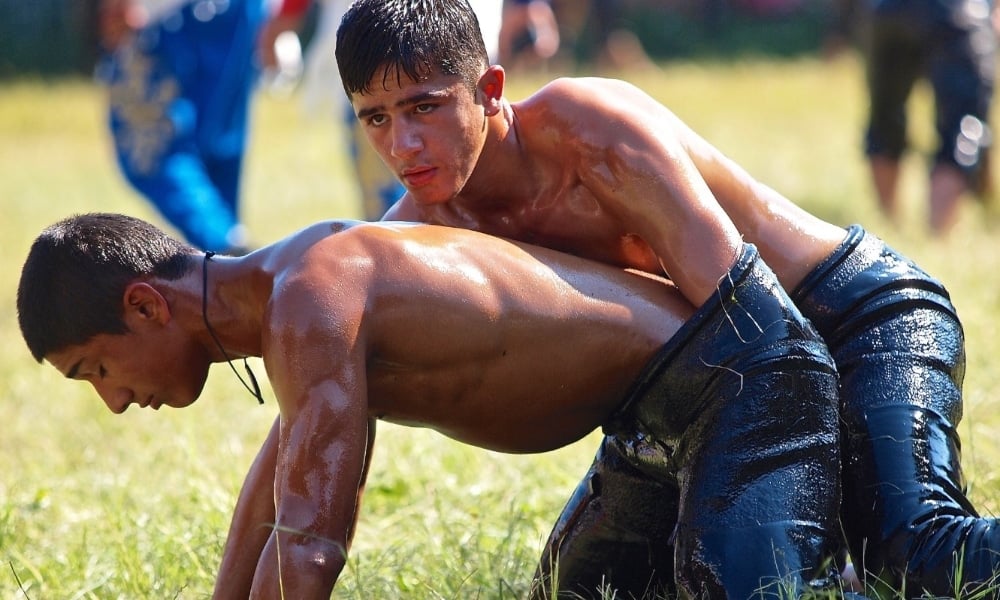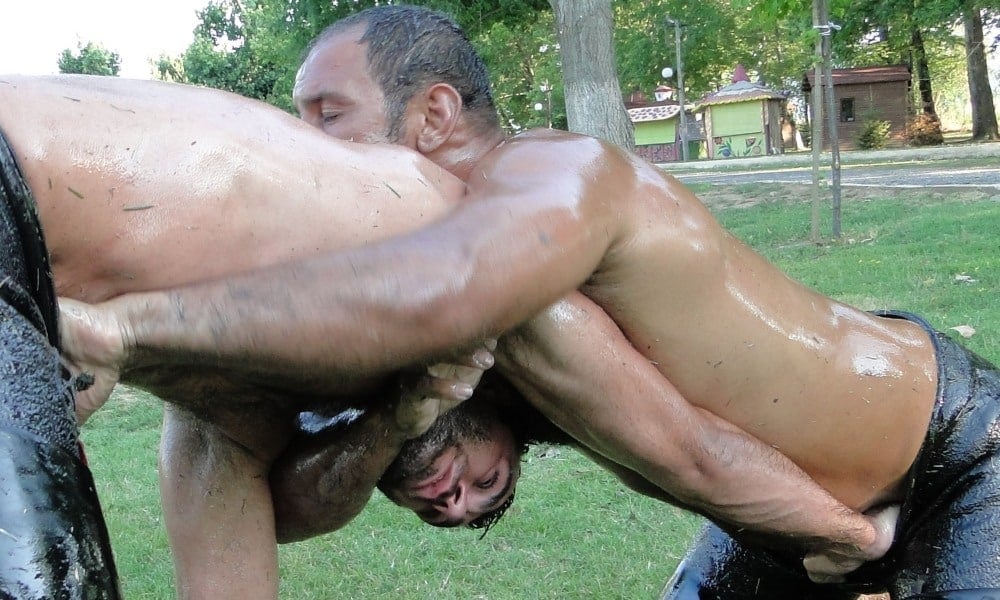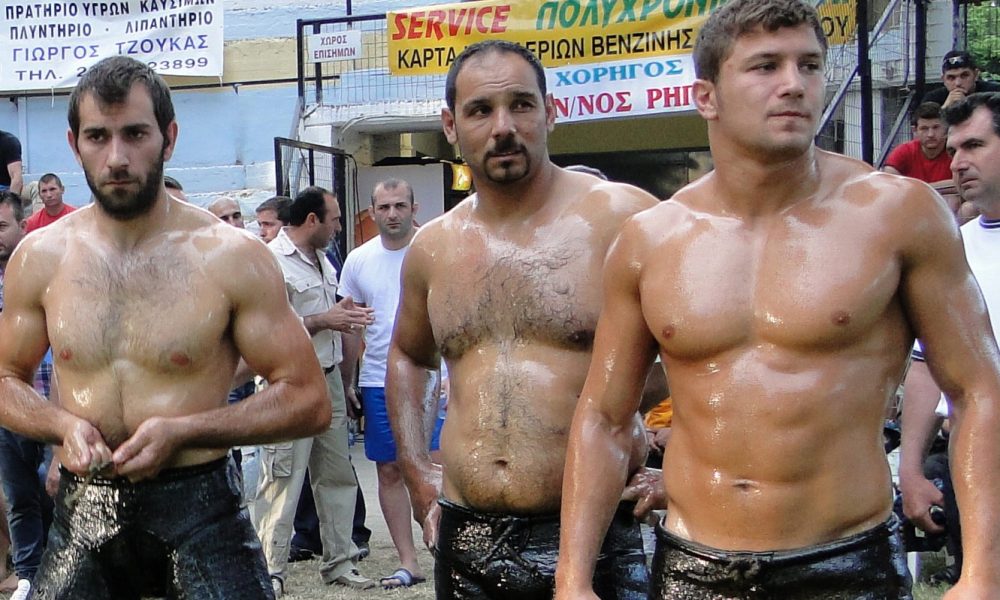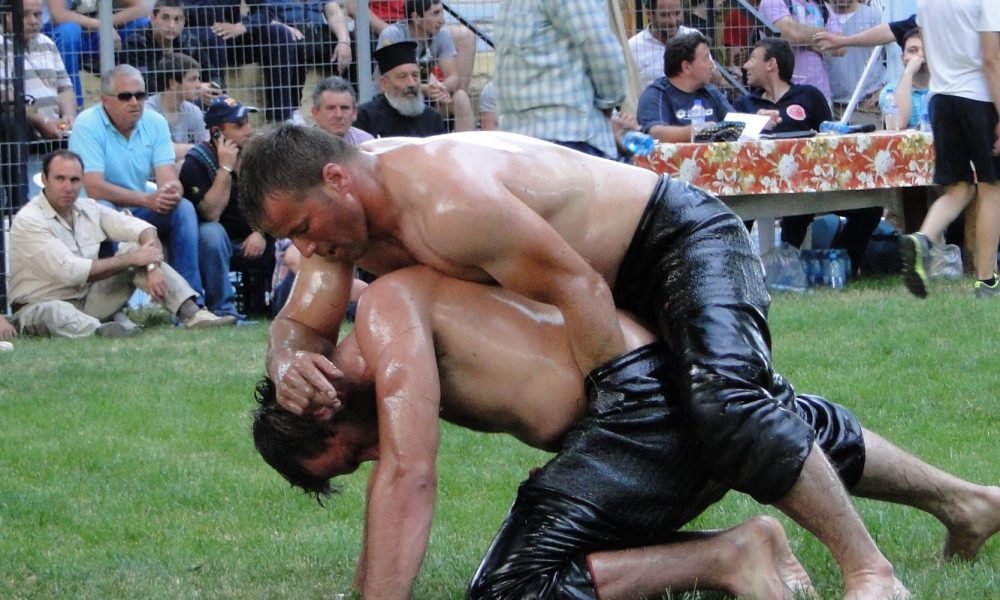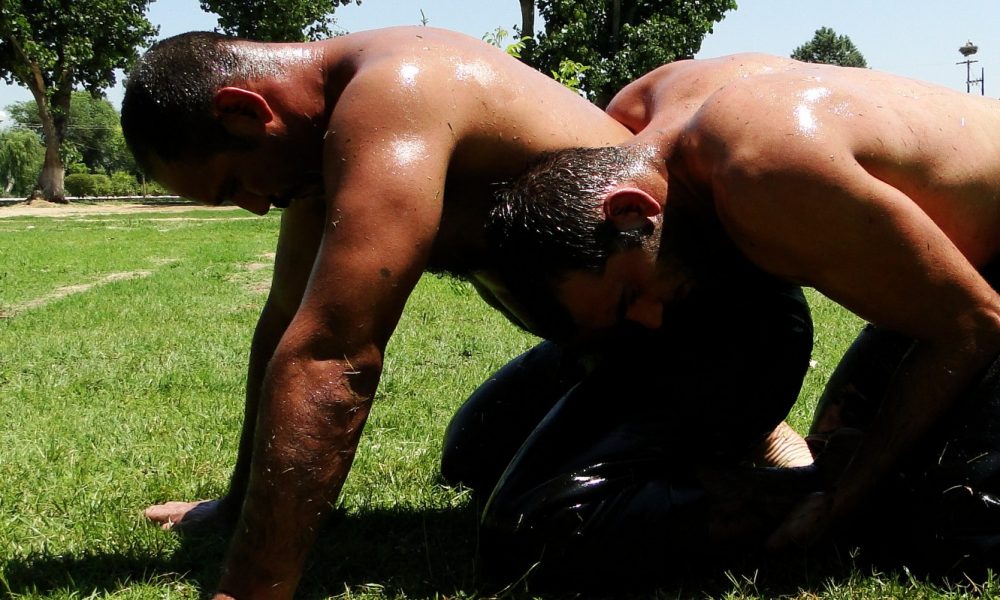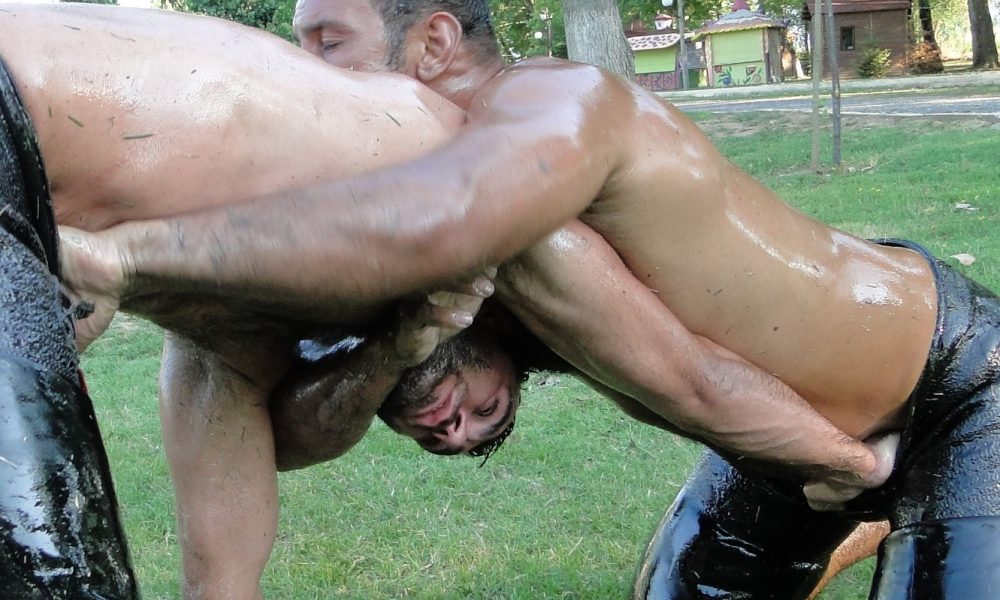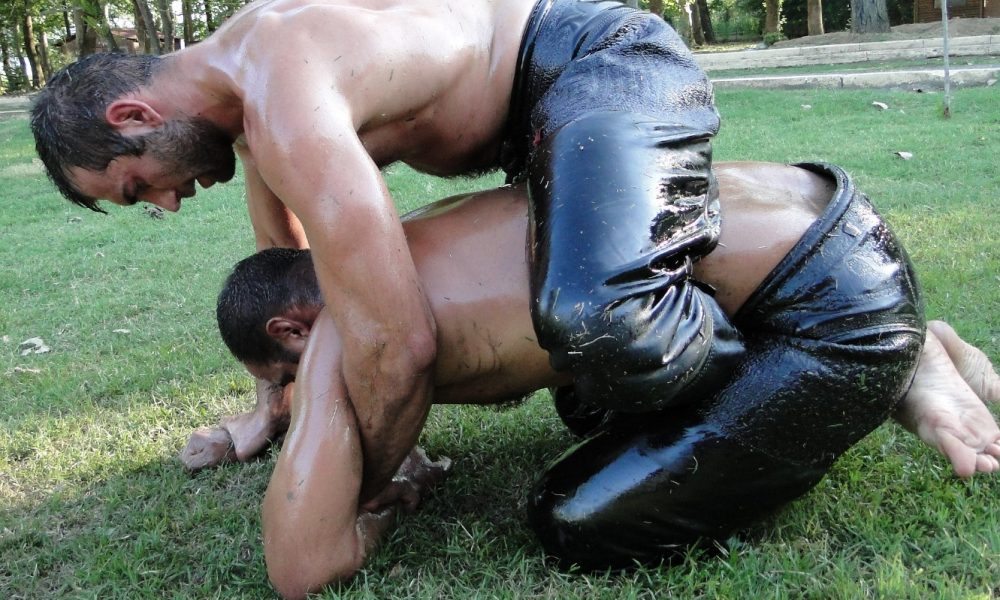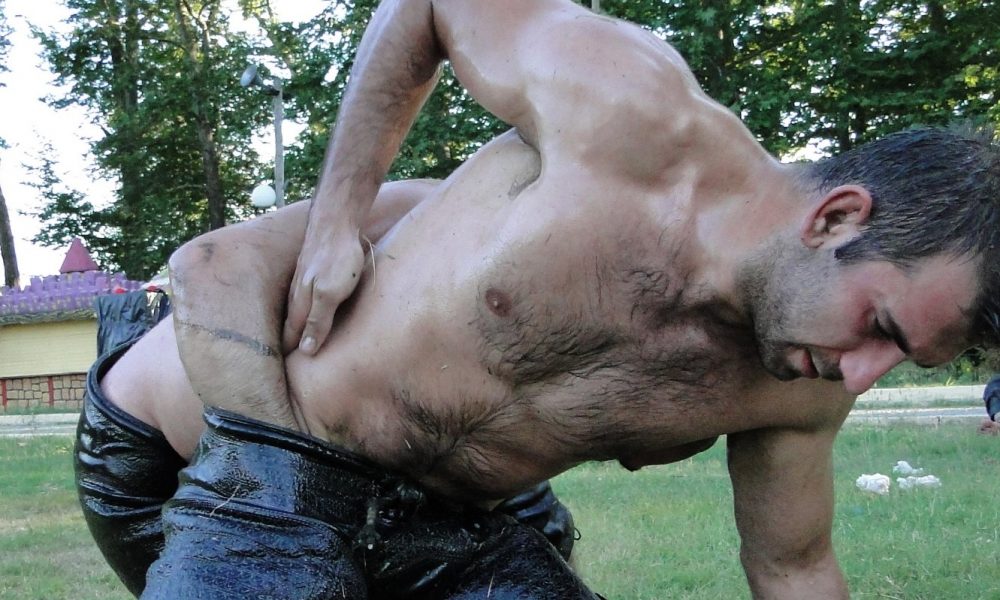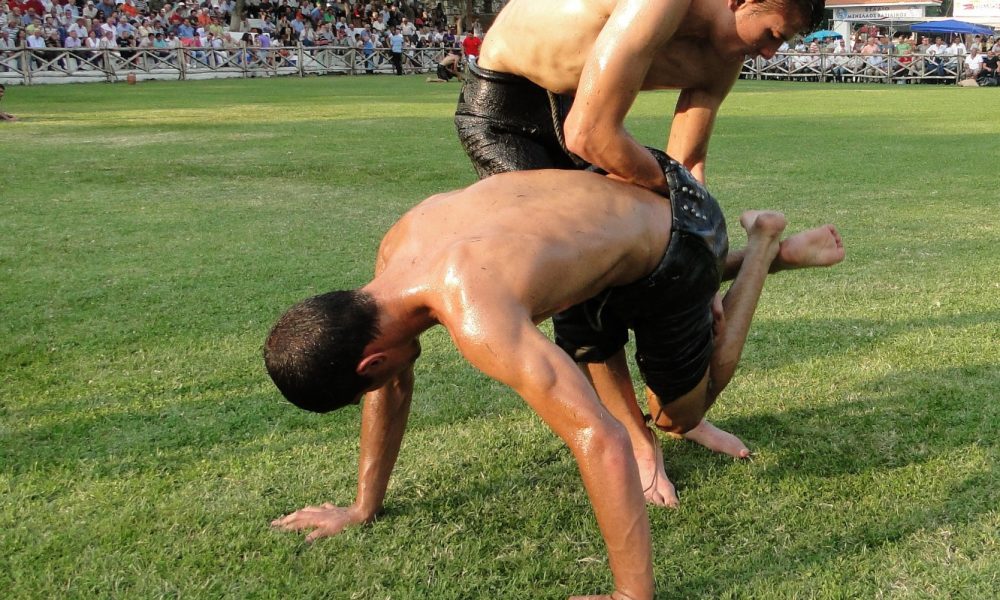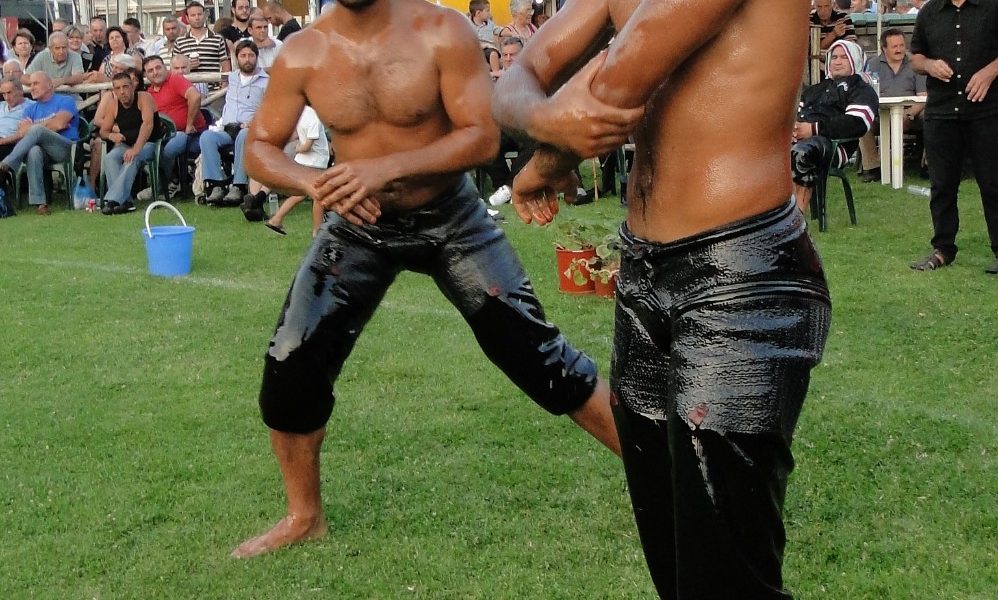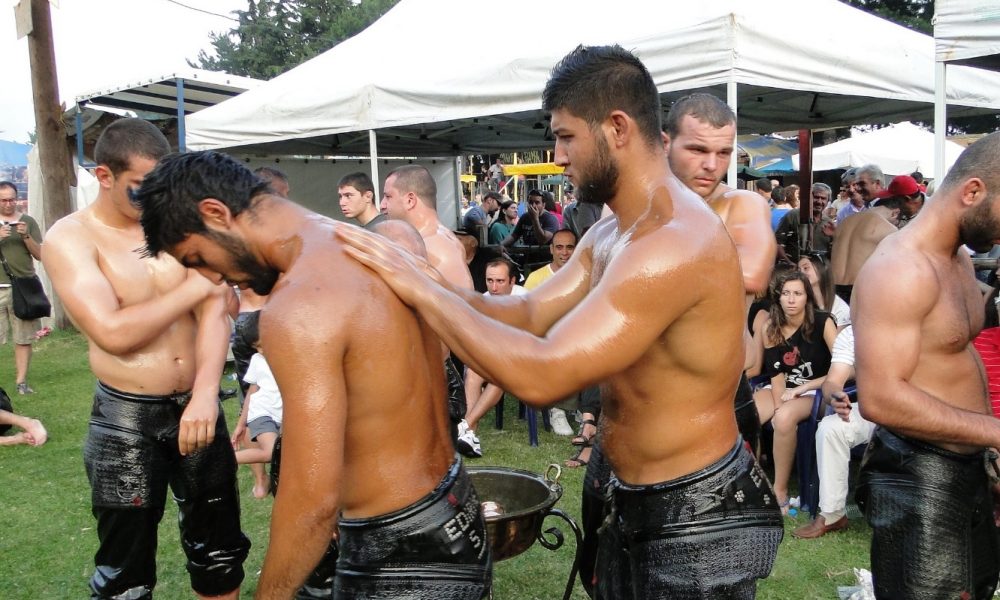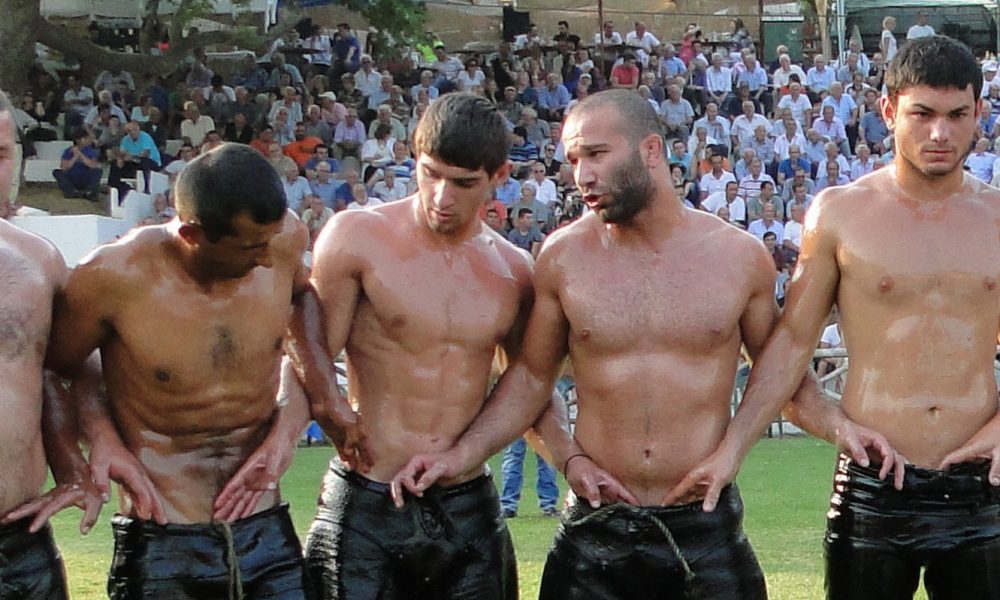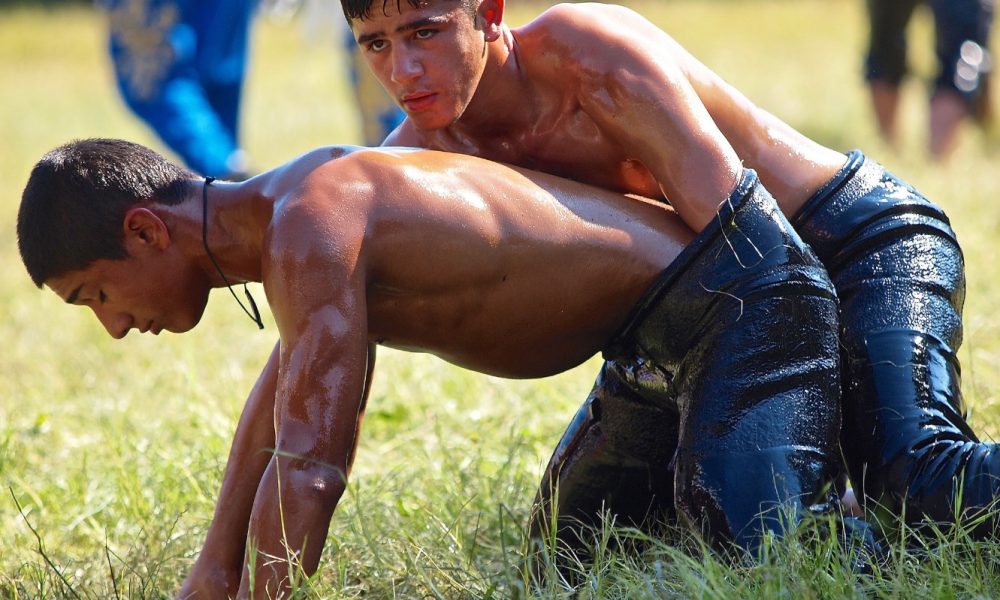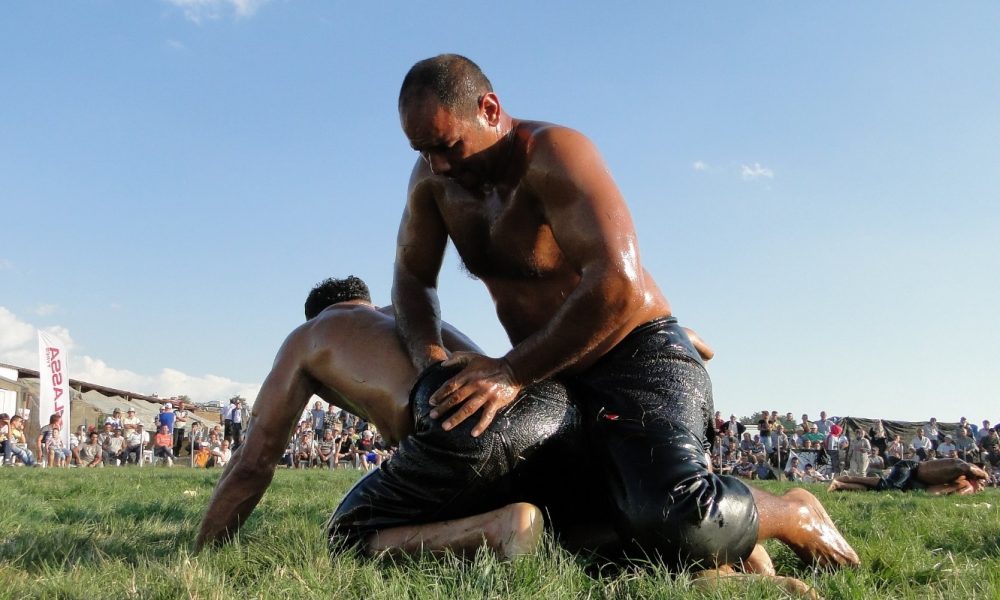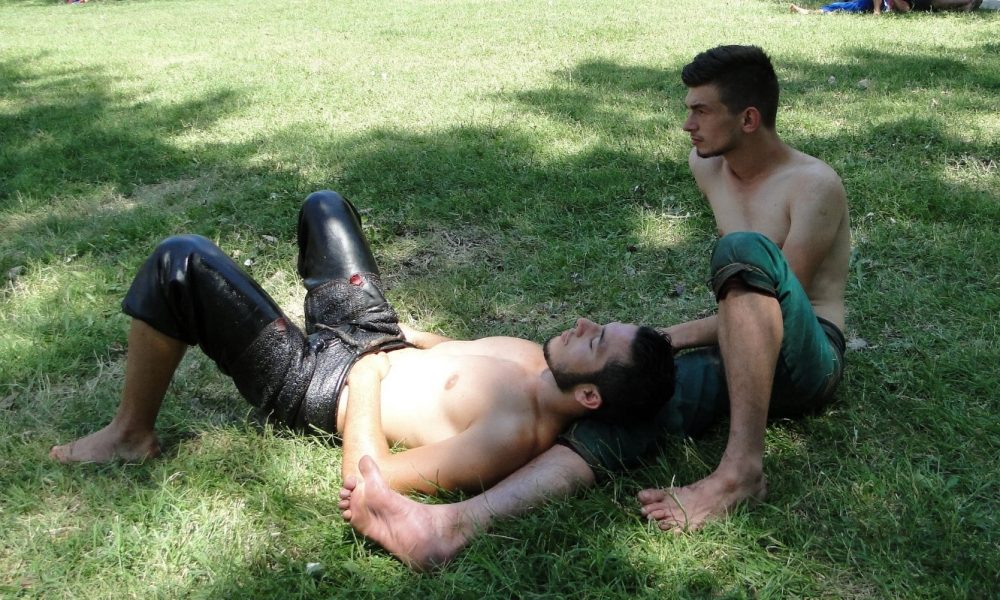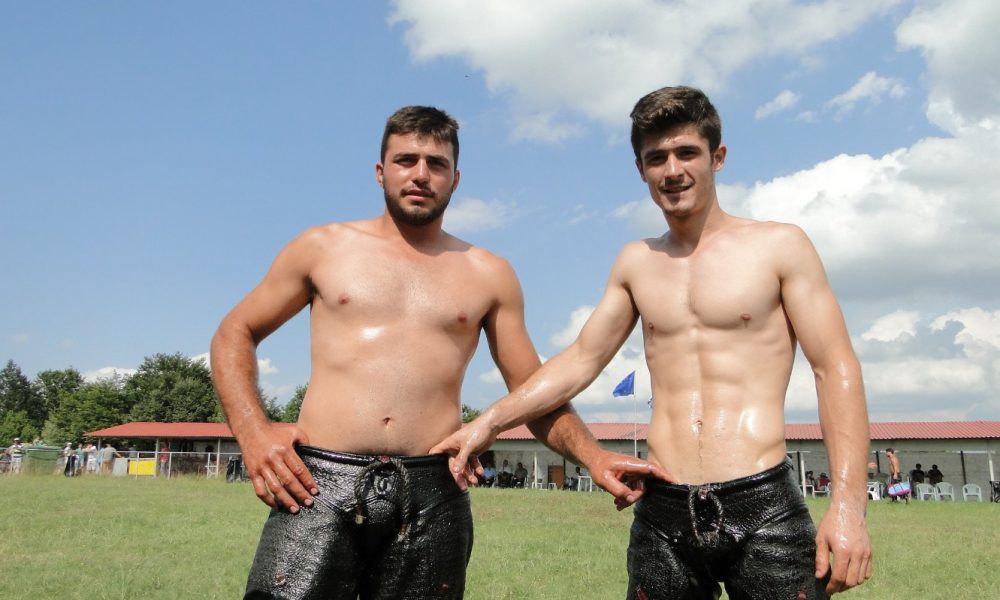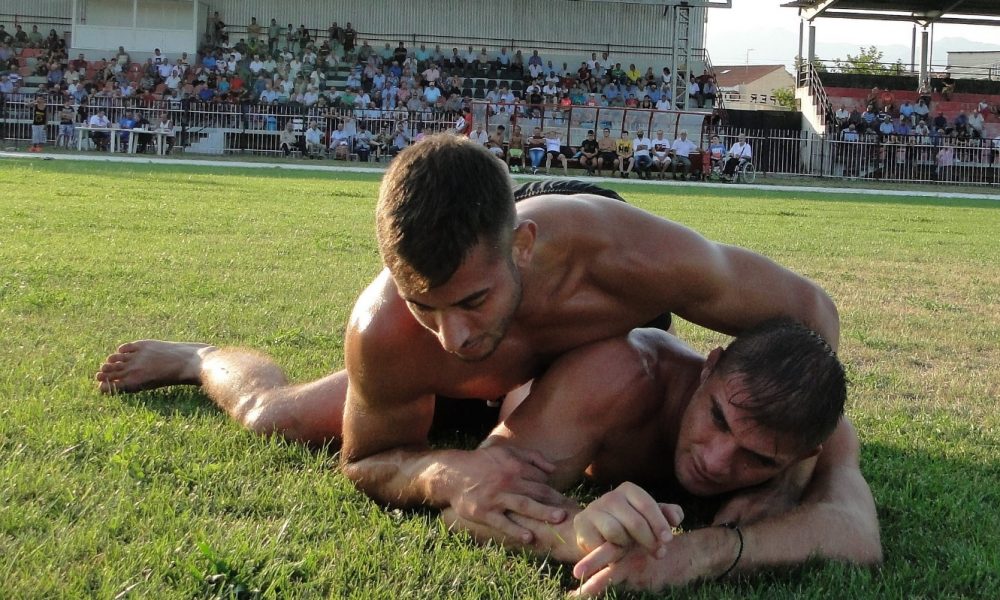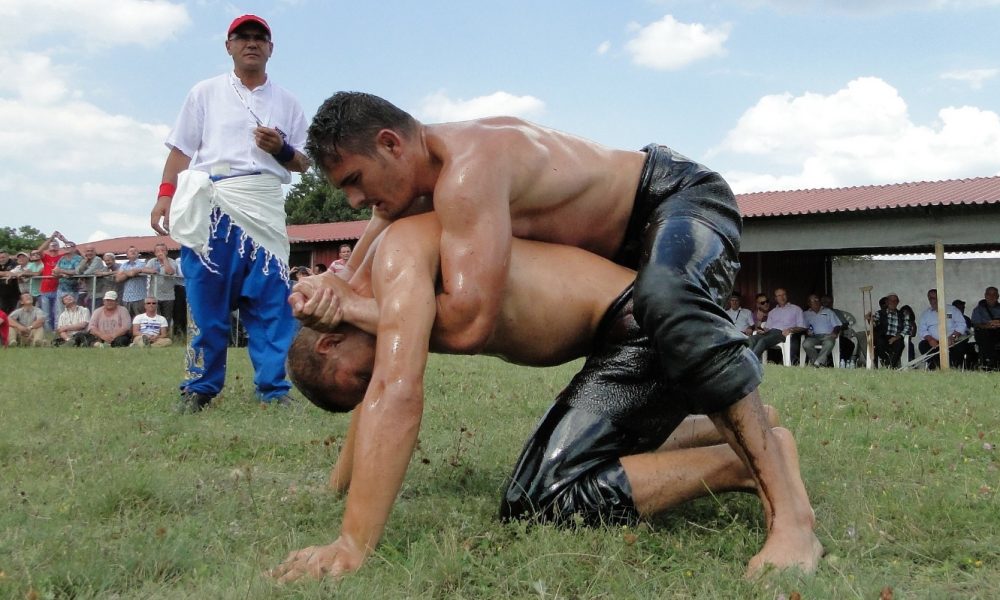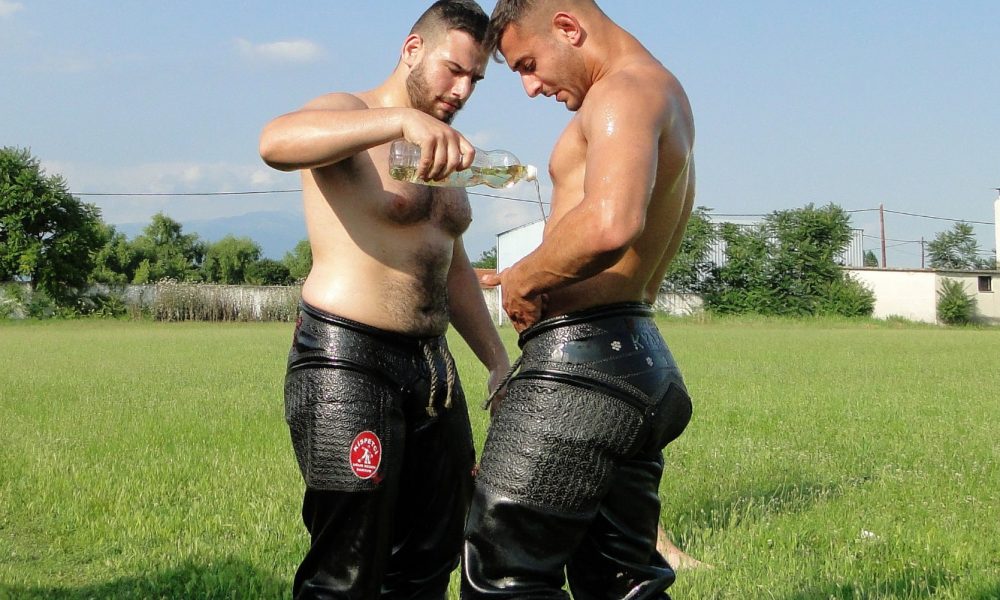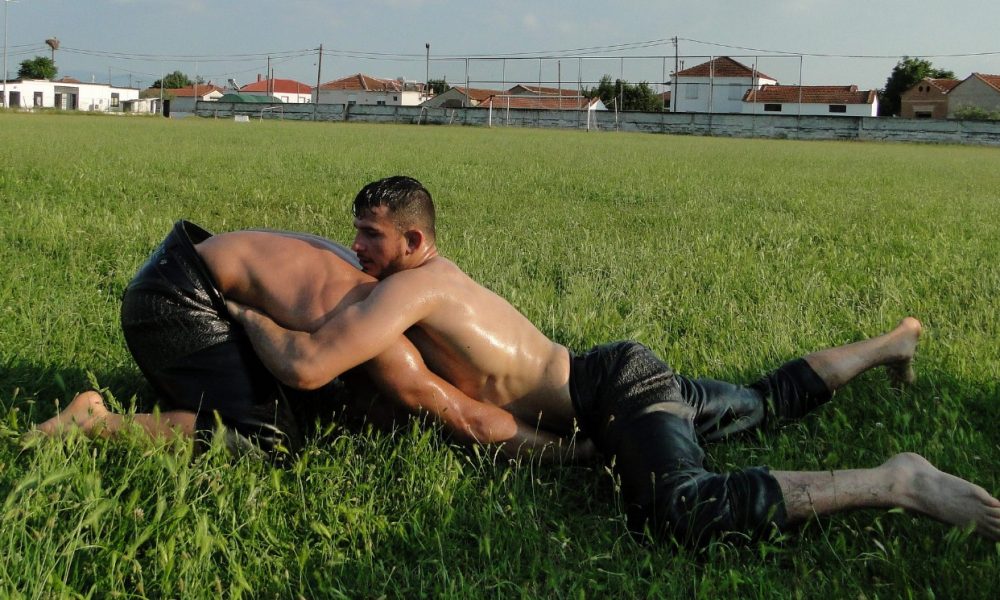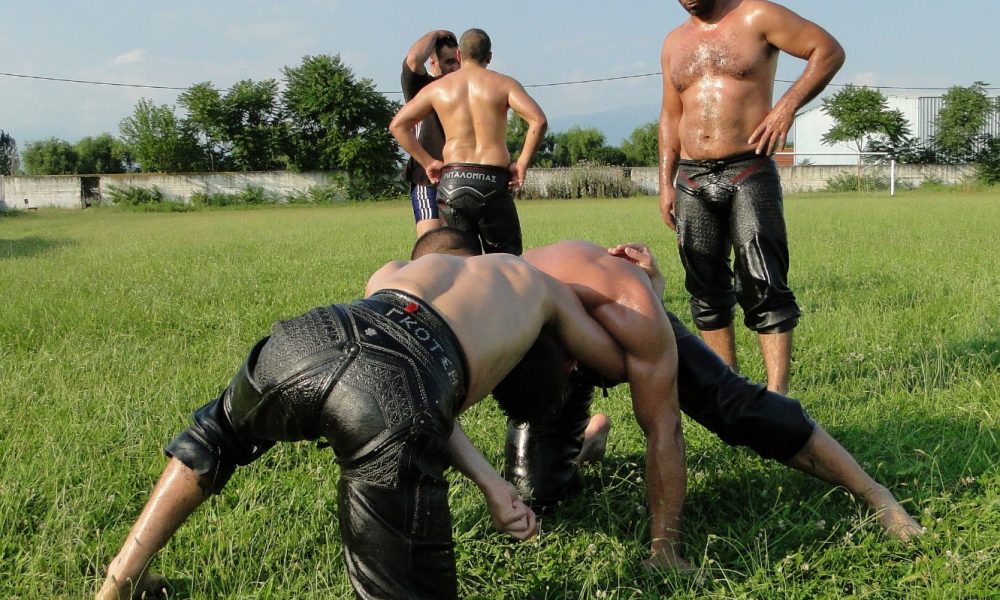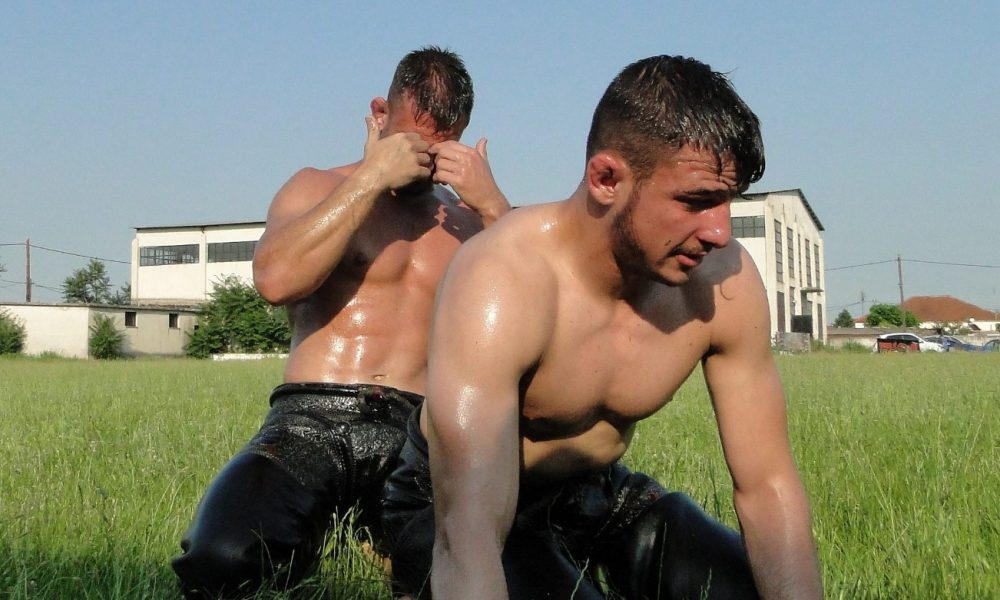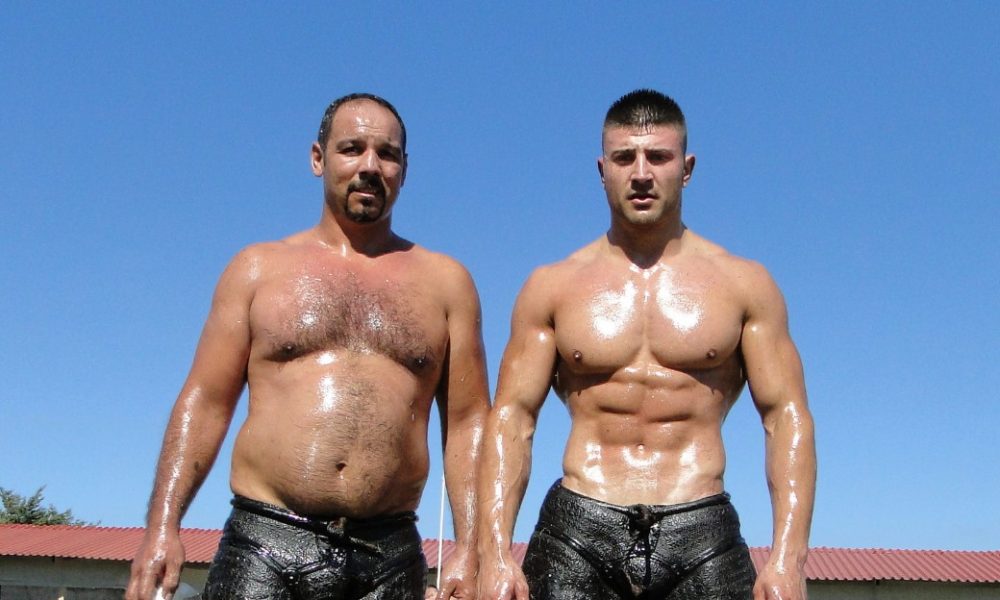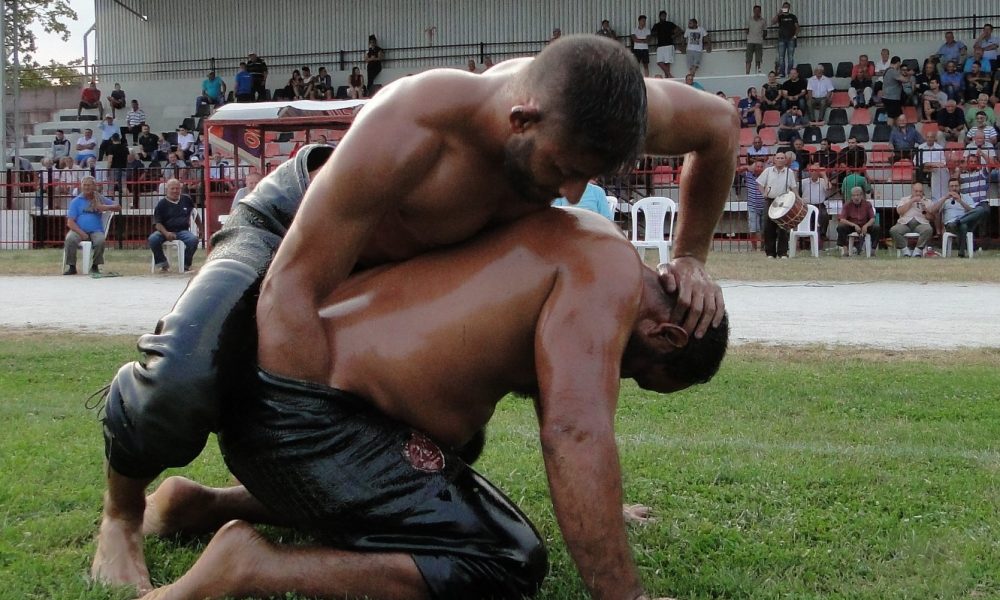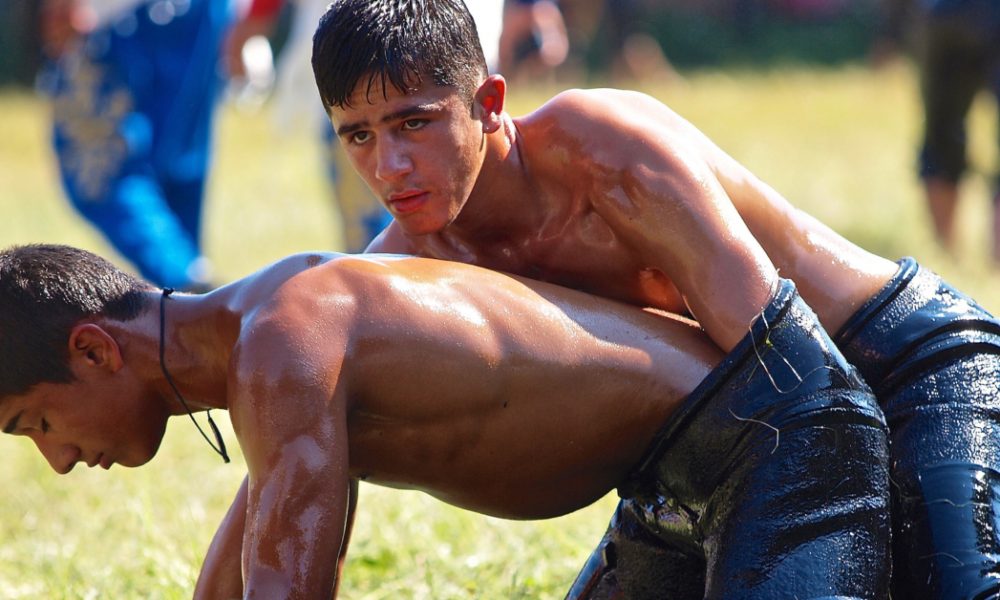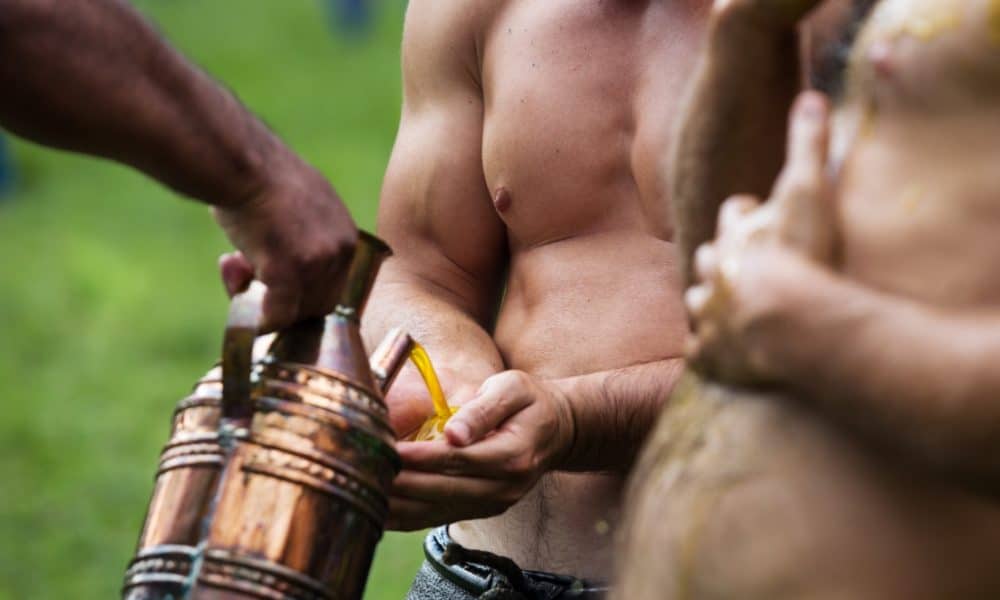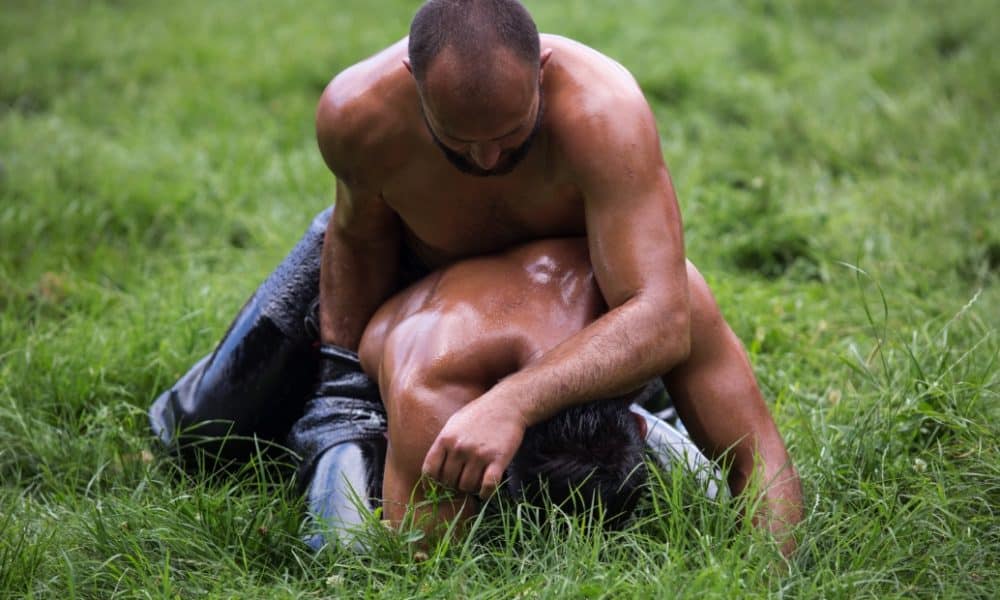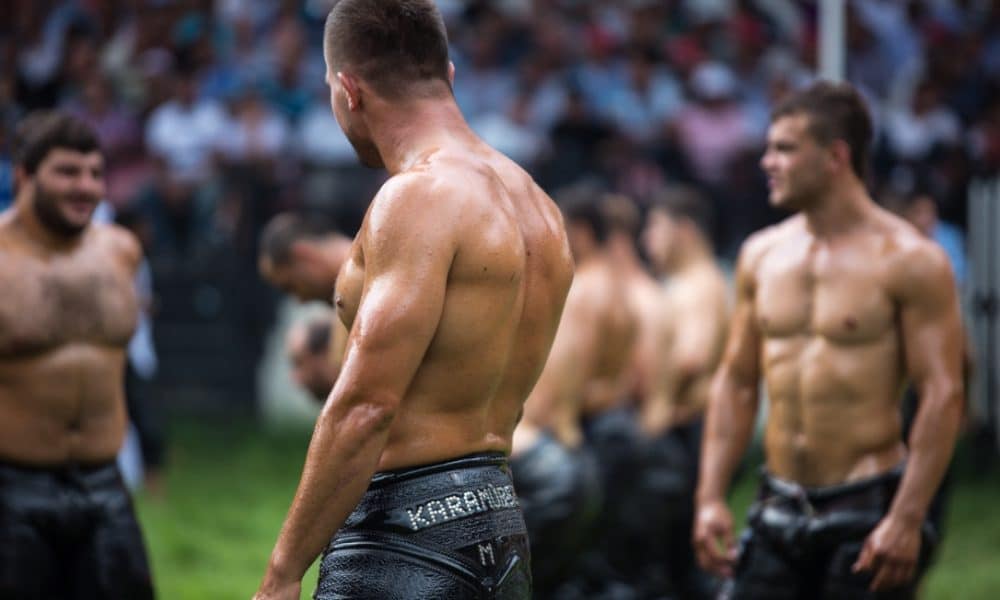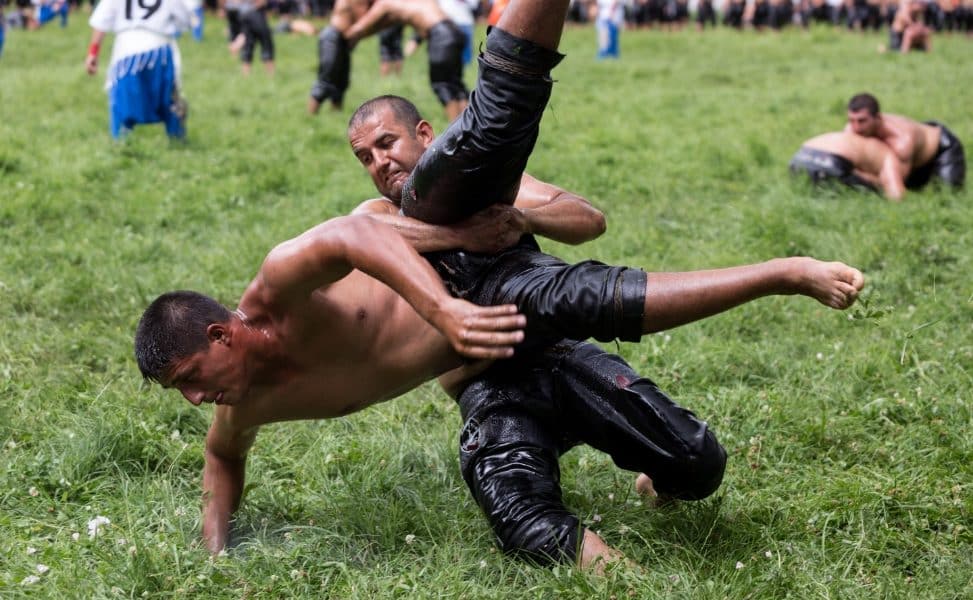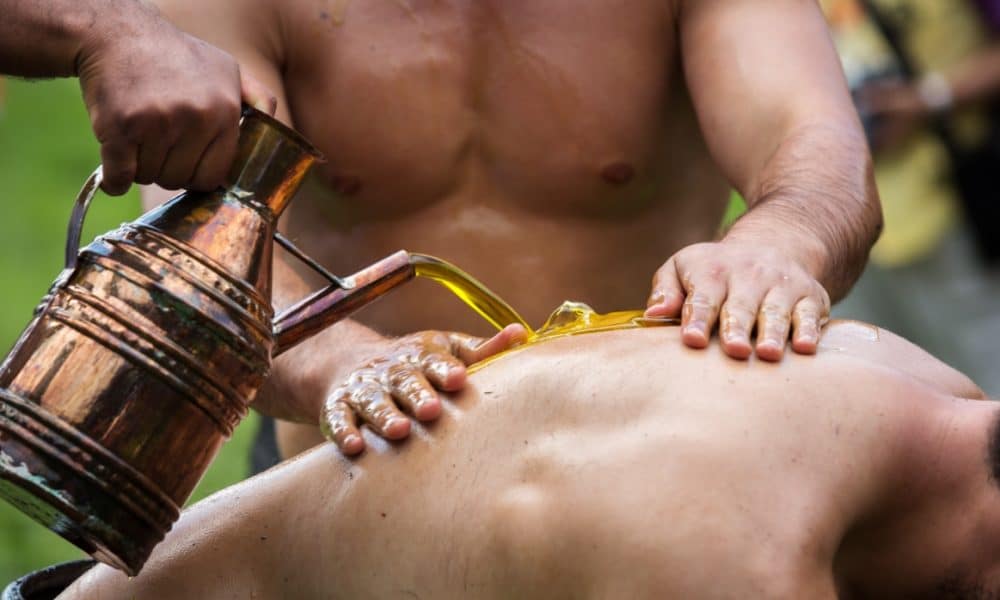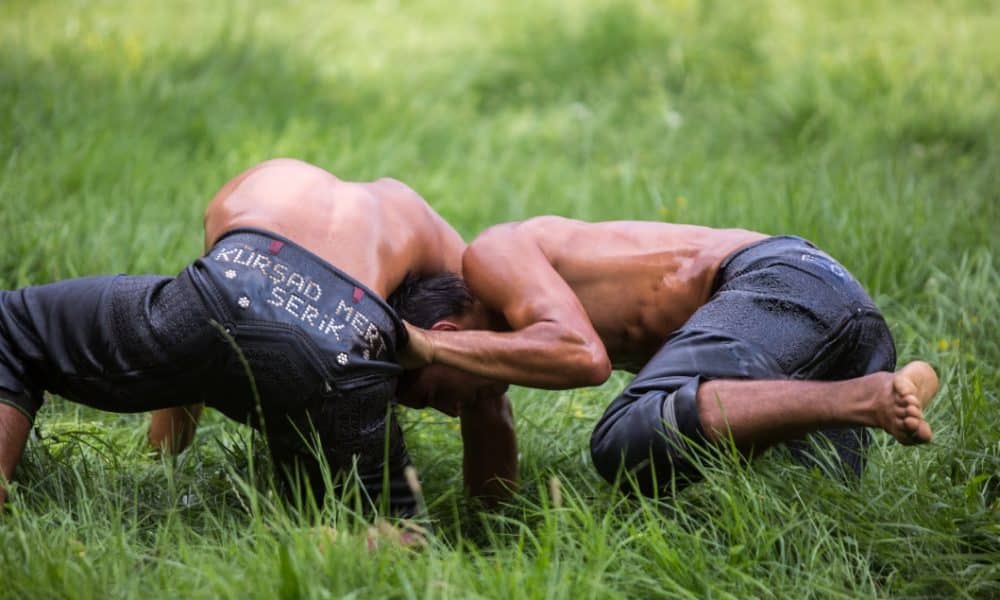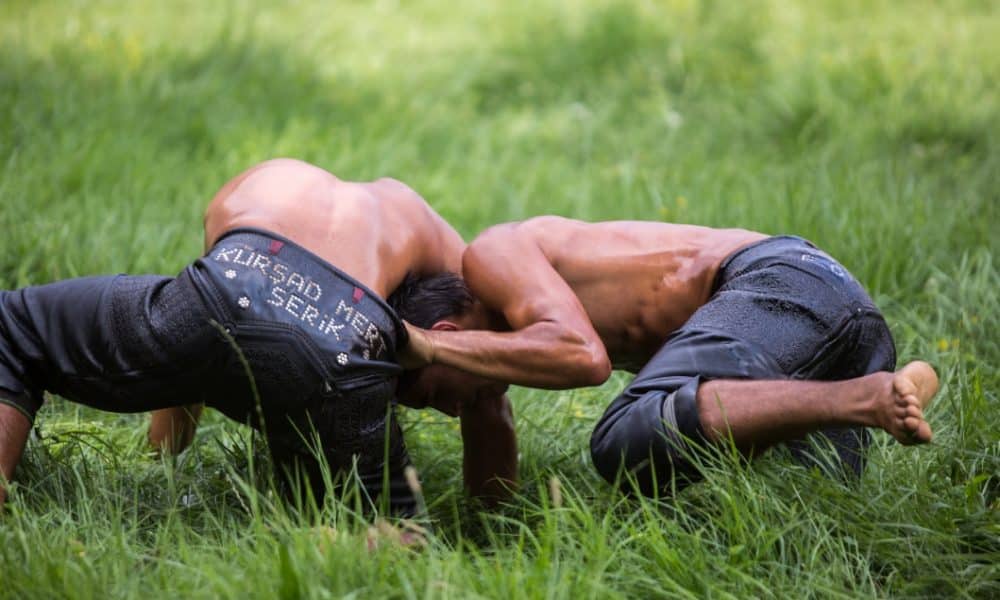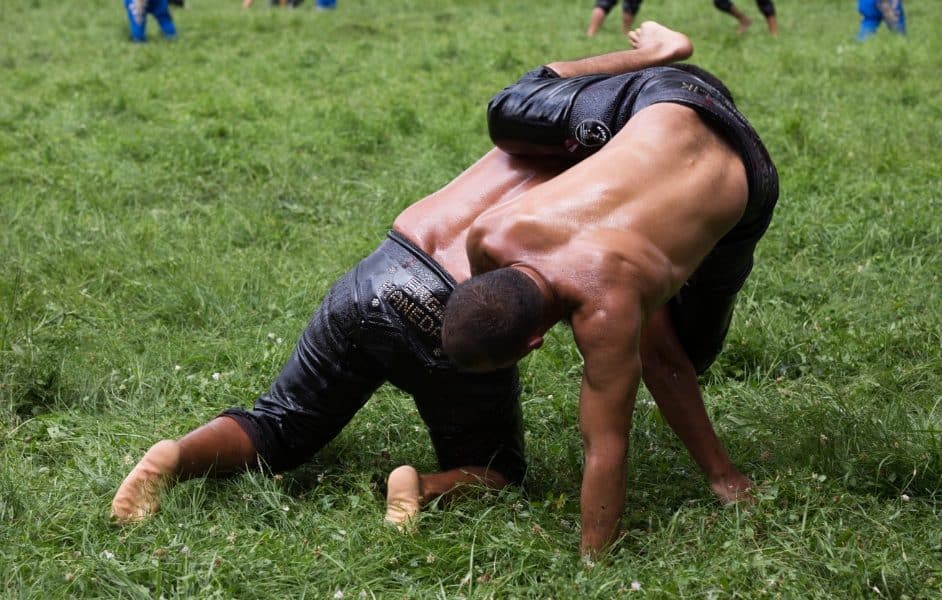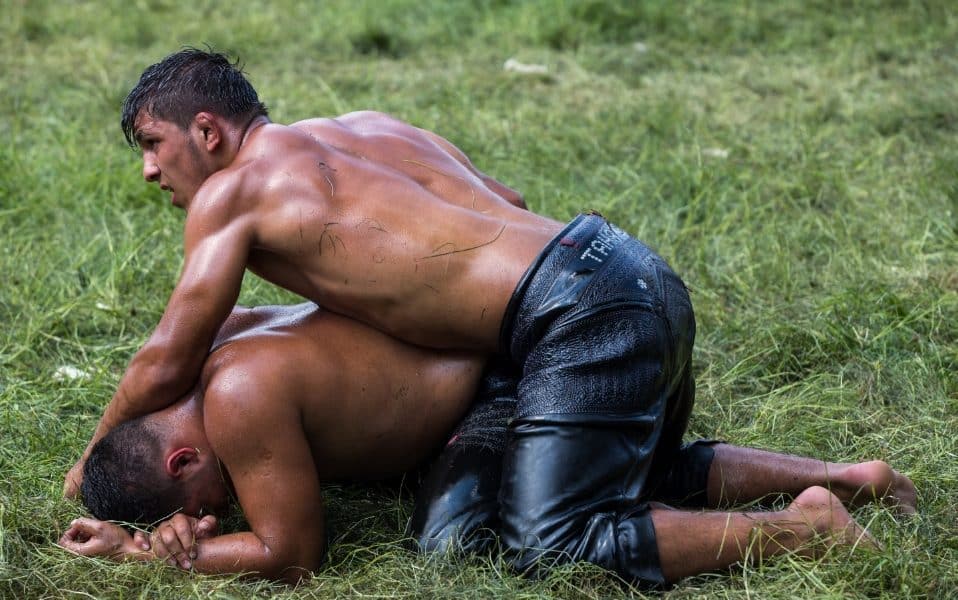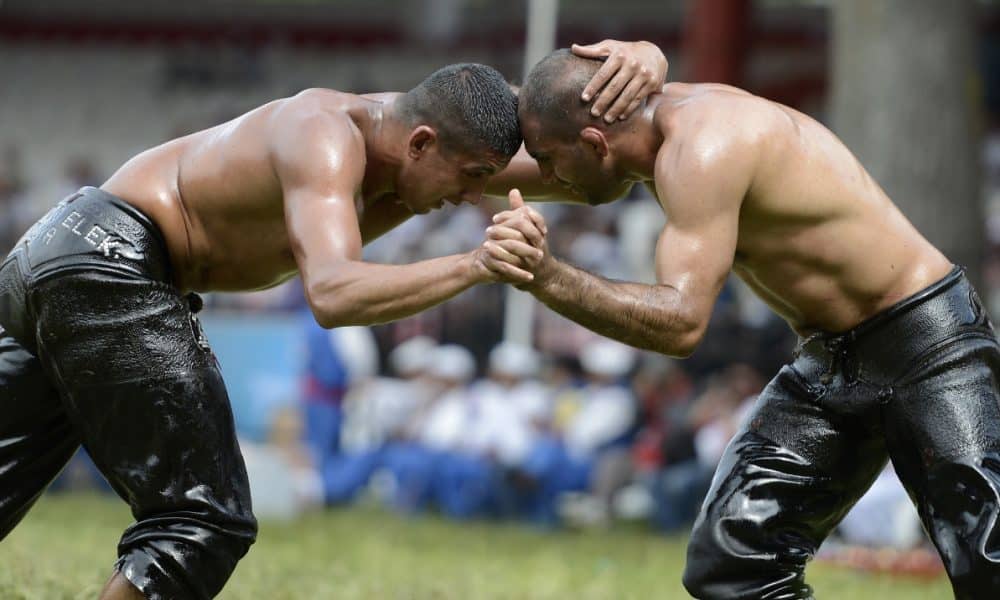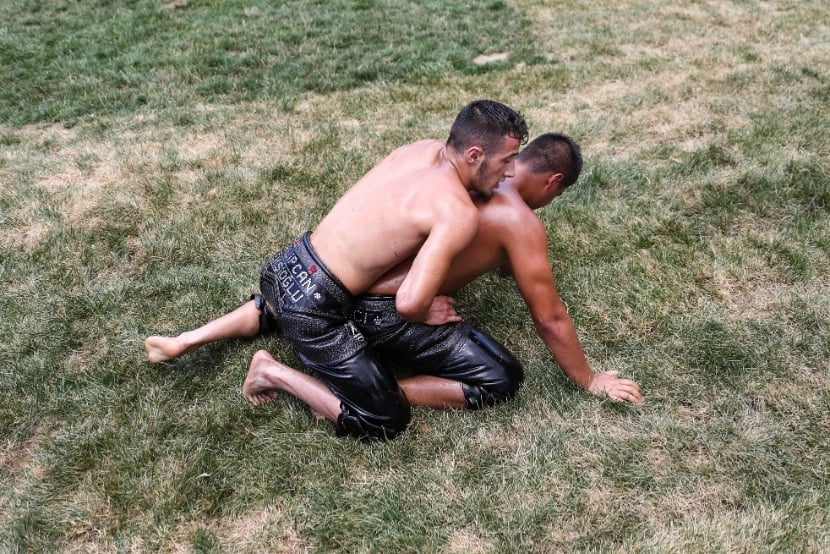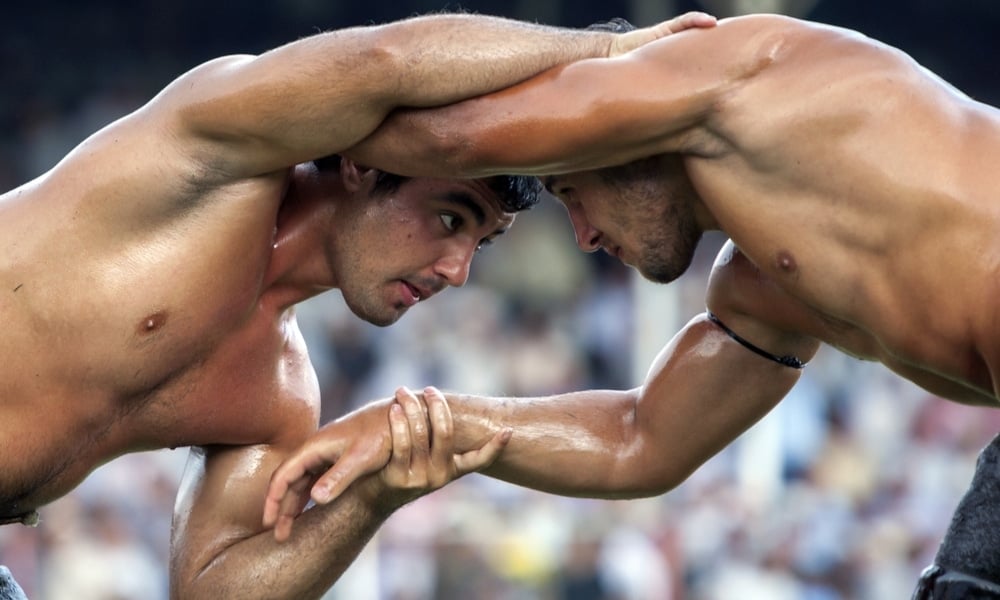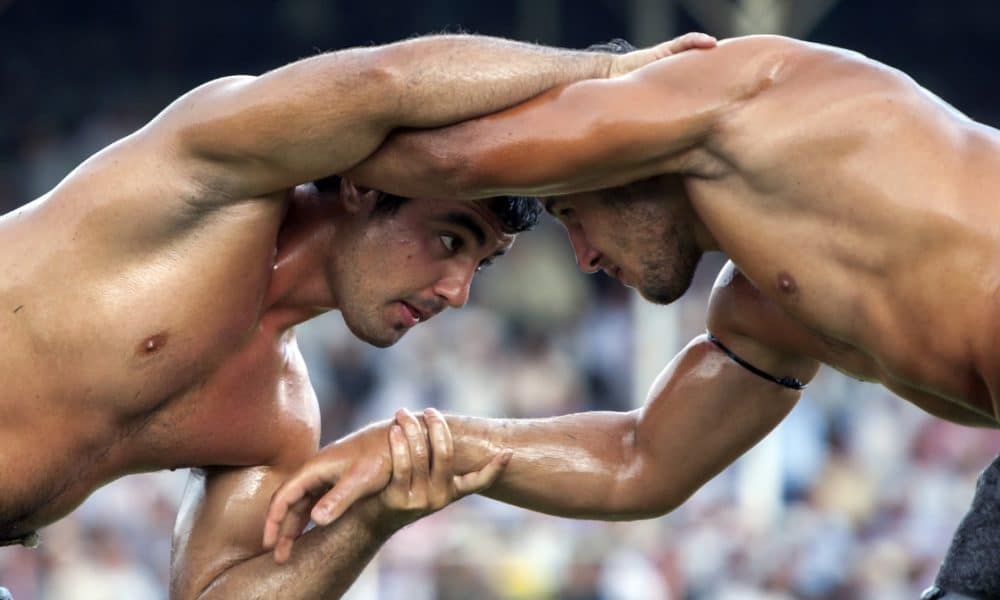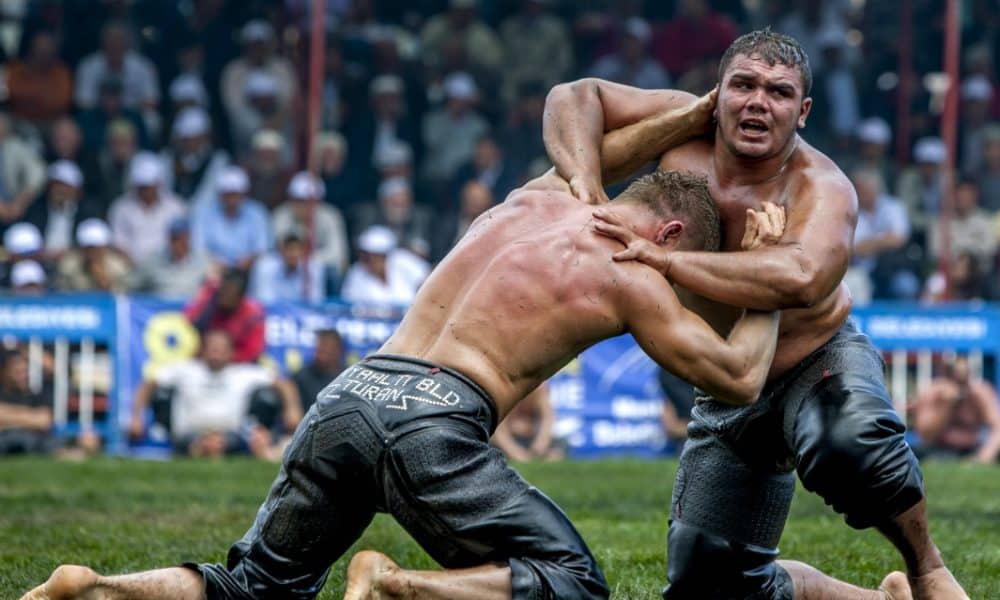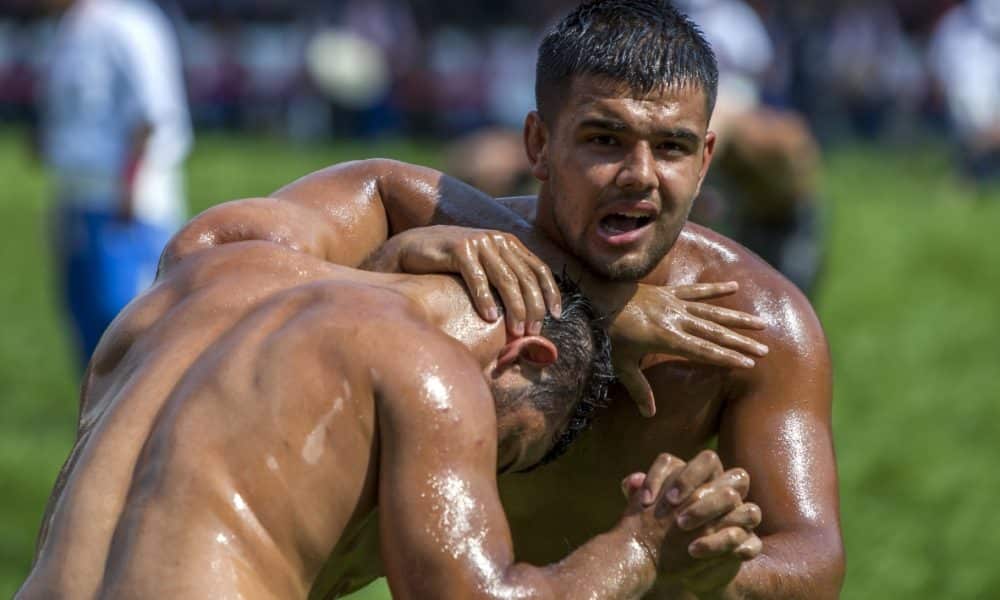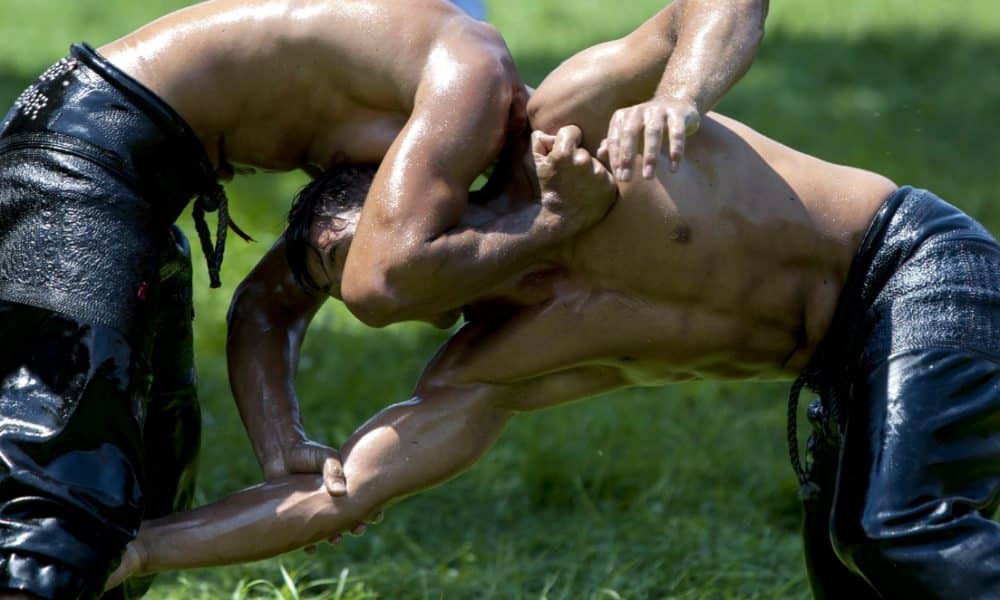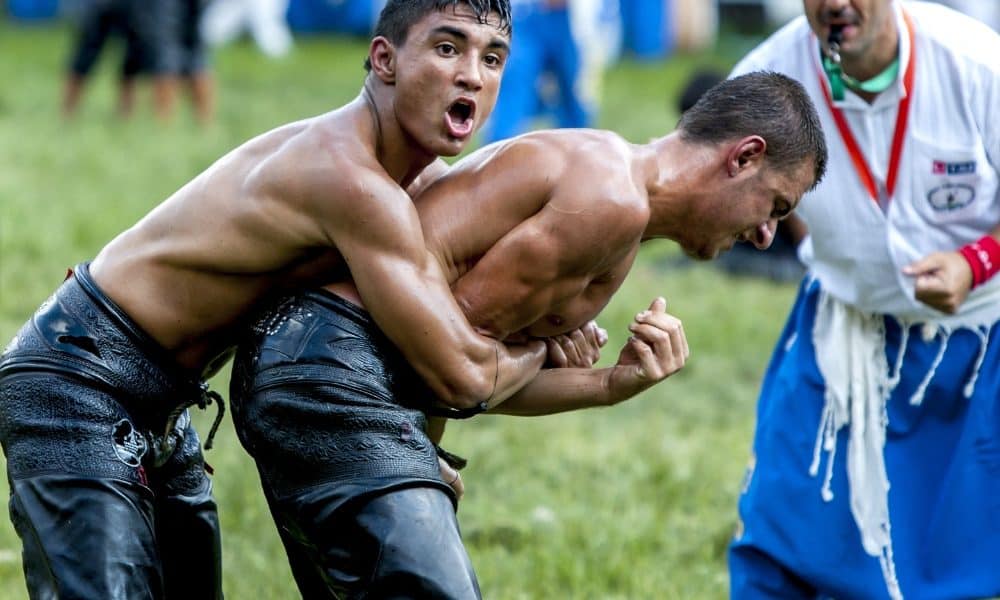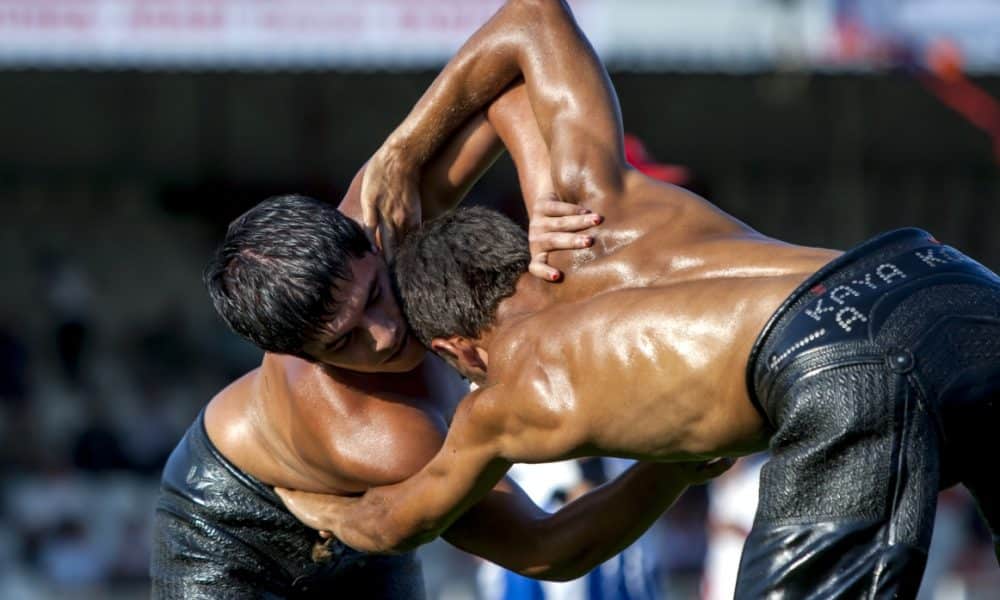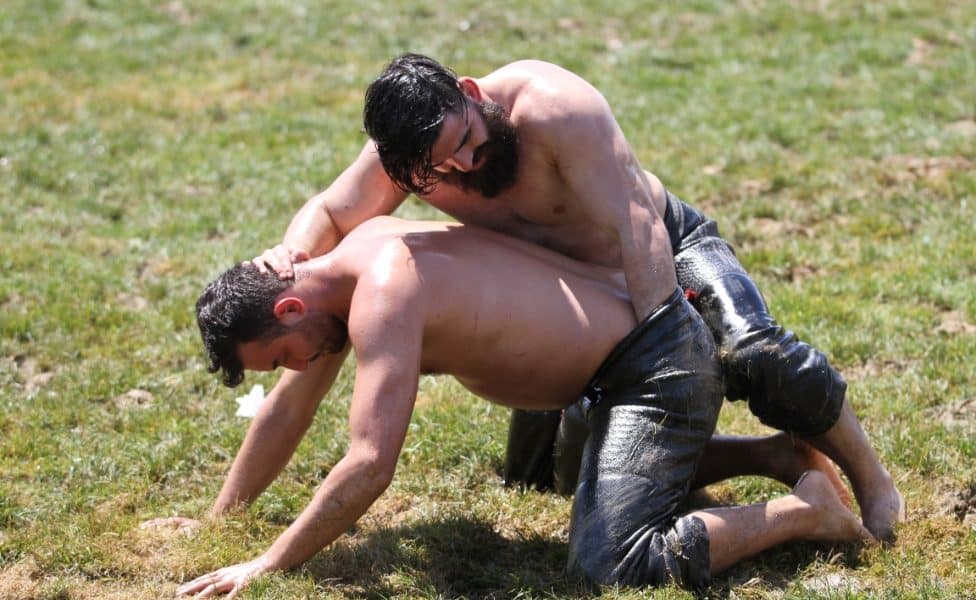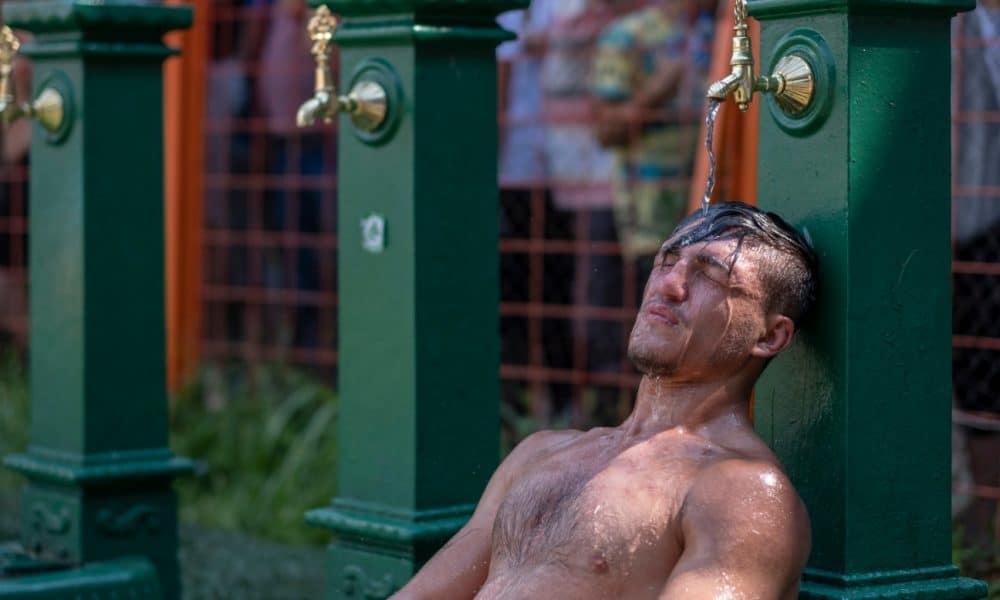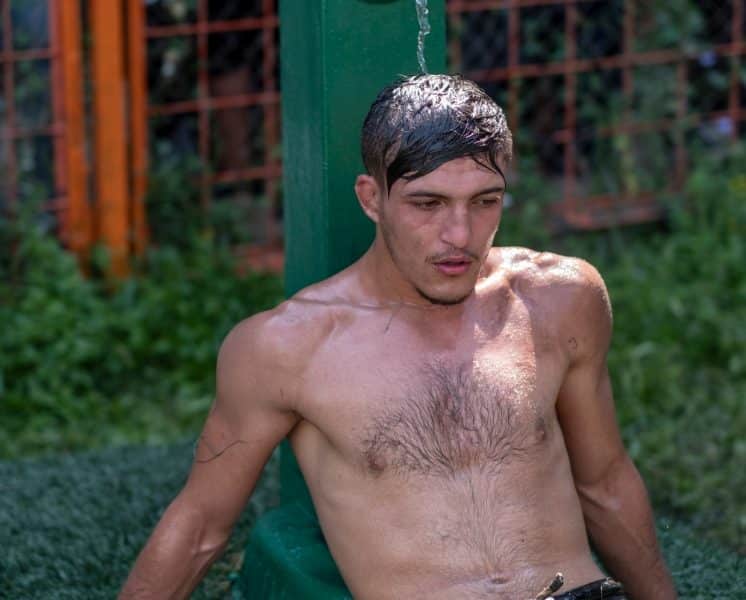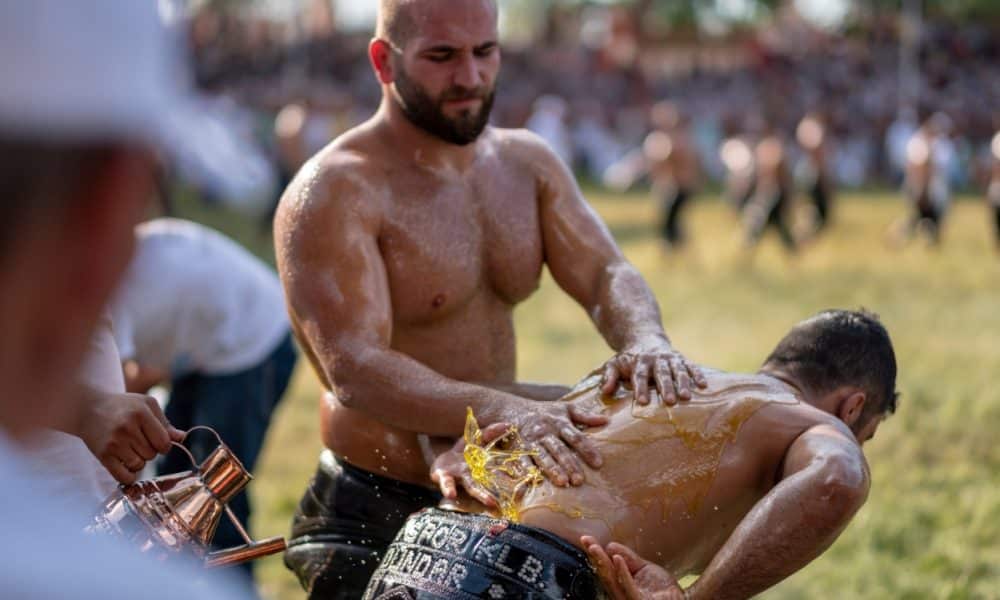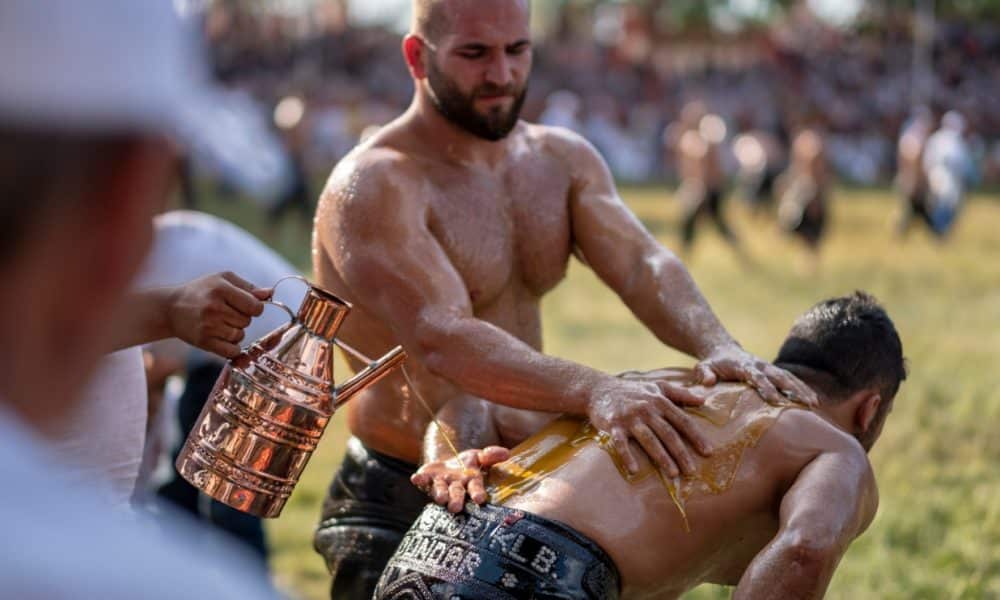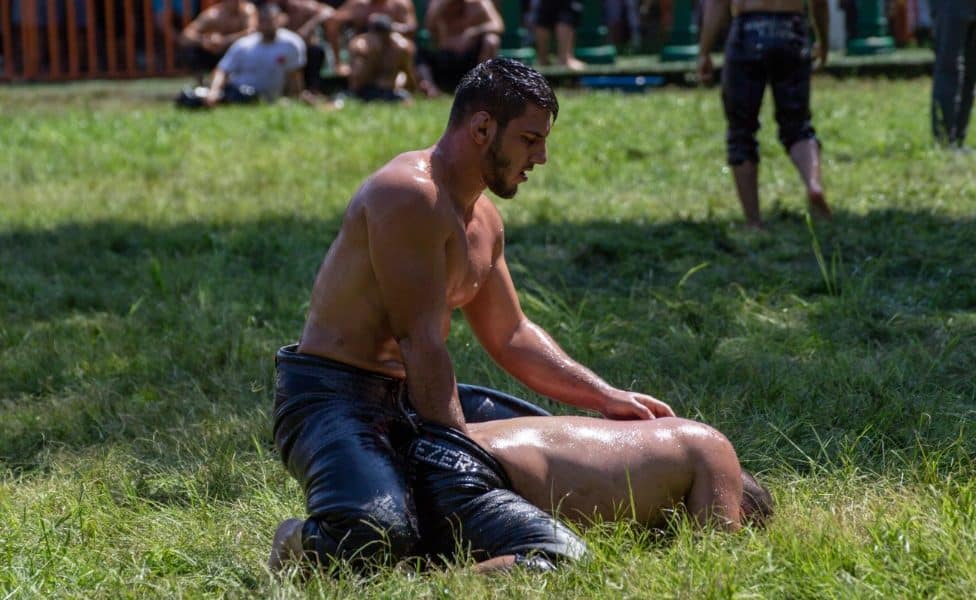Oil wrestling is one of the most popular sports in Turkey.
In the United States, two oily men wrestling each other in a park could probably be perceived as inappropriate. Luckily, that’s not the case in some other countries. In Turkey, for example, men oil up and grapple in the grass while thrusting their hands inside their partner’s leather trousers for a sport known as oil wrestling.
What Is Turkish Oil Wrestling?
Although to the untrained eye it may look like a circuit party; it’s actually a sport known as oil wrestling or grease wrestling (Yagli Gures in Turkish). Oil wrestling, Turkey’s national sport, is a combat sport in which men douce their bodies in olive oil and then attempt to pin their opponents, there’s no penalty for holding.
The entire competition is based on contenders battling to shove their hands down their opponent’s pants, which are called kispet. While it may appear to be lawless their wrestling, there are rules to the game. For example, wrestlers are not allowed to take hold of their opponents.
Related | 25 Underwater Portraits to Remember Photographer Lucas Murnaghan
While pinning an oiled lad is typically an easy job, it’s much harder when your partner is trying to top and pin you at the same time. According to the rules of Turkish Wrestling, the first fighter to have their “umbilicus exposed to heaven” loses the match. To win, you must keep your umbilicus (belly button) facing the ground at all times.
Although the photos below are exciting in general, the most captivating factor is the level of physical comfort the men have in touching each other. In many cultures, that degree of contact could be viewed as taboo.
Scroll through 50 of our favorite oil wrestling photos paired with 25 facts about Turkey’s National Sport.
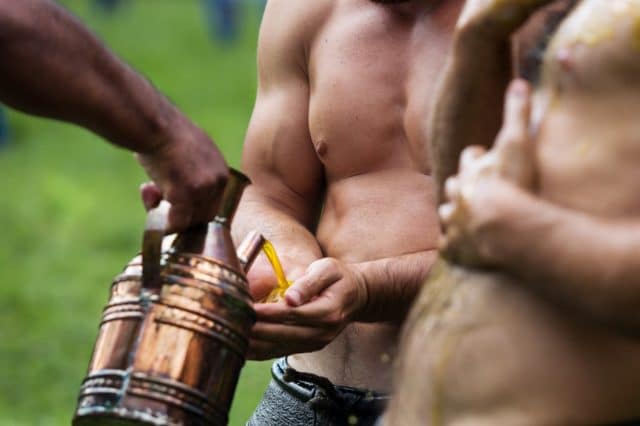
1. Oldest Tradition: Turkish oil wrestling, or Yağlı Güreş, dates back over 650 years, making it one of the oldest sports in the world. Its roots can be traced to the nomadic Turks who brought the sport to Anatolia in the 11th century. Today, it is celebrated as a cornerstone of Turkish cultural heritage.

2. Festival of Kirkpinar: The Kirkpinar Oil Wrestling Festival, held annually in Edirne, is recognized as one of the longest-running sporting events in the world. It began in 1362 to celebrate Ottoman military victories. The festival lasts a week and attracts thousands of spectators and wrestlers from around the world.
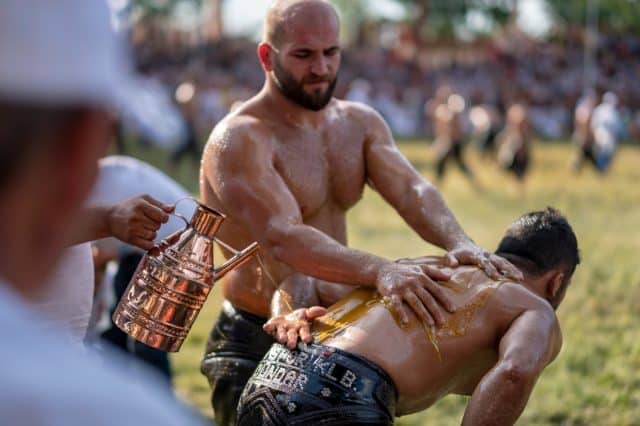
3. National Sport: Oil wrestling is considered the national sport of Turkey, symbolizing the country’s rich cultural traditions. It is deeply embedded in Turkish folklore, often associated with themes of heroism, strength, and honor. Though modern sports like soccer have gained prominence, oil wrestling holds a unique place in the nation’s heart.
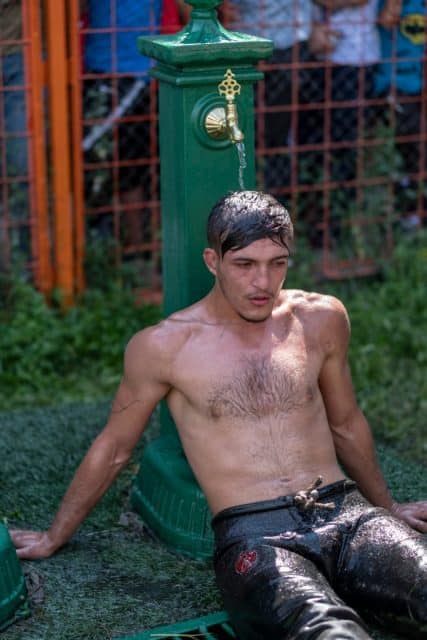
4. Olive Oil: Wrestlers cover themselves in olive oil before matches to make gripping their opponent more challenging. This unique feature distinguishes Turkish oil wrestling from other forms of wrestling. The oil makes it difficult for wrestlers to maintain holds, leading to a display of skillful techniques and agility.
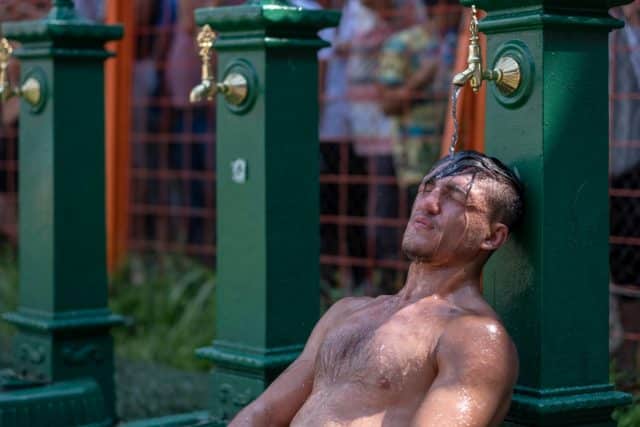
5. Kispet: Wrestlers wear leather trousers called kispet, traditionally made from water buffalo or cowhide, which can weigh up to 13 pounds. The tight-fitting pants are designed to withstand the rigors of the match and are often handmade, passed down from generation to generation. Wrestlers attempt to grab the inside of their opponent’s kispet for leverage during matches.

6. Open-Air Wrestling: Turkish oil wrestling matches are typically held outdoors on grassy fields, adding a layer of difficulty as the grass becomes slippery with oil. Wrestling on uneven, natural terrain challenges the wrestlers’ balance and stamina. The outdoor setting also emphasizes the sport’s deep connection to nature and tradition.
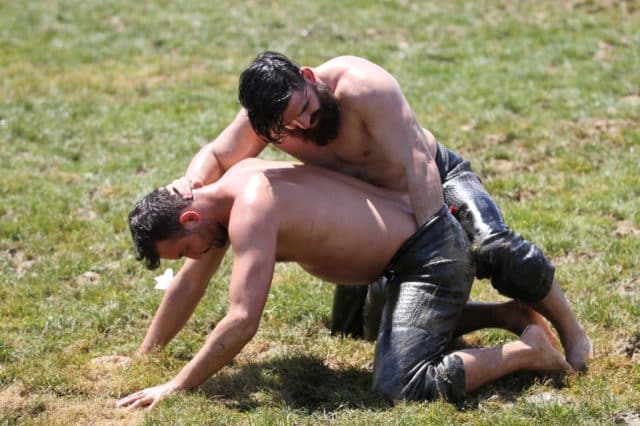
7. Weight Classes: Unlike many modern wrestling sports, traditional Turkish oil wrestling does not divide competitors into weight classes. Wrestlers of different sizes and weights can compete against each other, placing emphasis on technique rather than sheer size. This creates unique matchups where skill often prevails over strength.
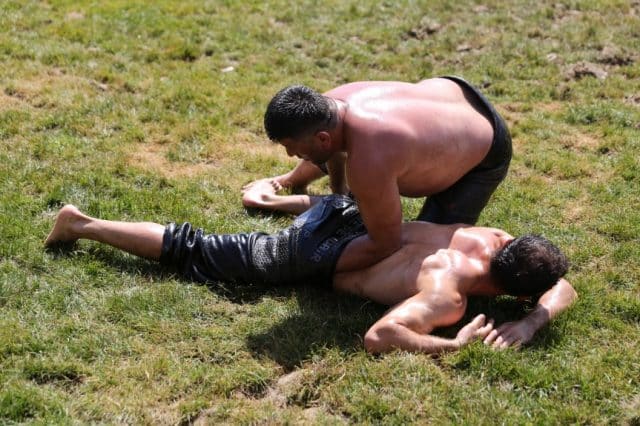
8. Pehlivan: Wrestlers in Turkish oil wrestling are called pehlivan, meaning “hero” or “champion,” a title of respect and honor. Historically, pehlivans were celebrated warriors and athletes, embodying physical and moral strength. Today, the title is still used to recognize the bravery and skill of the wrestlers.
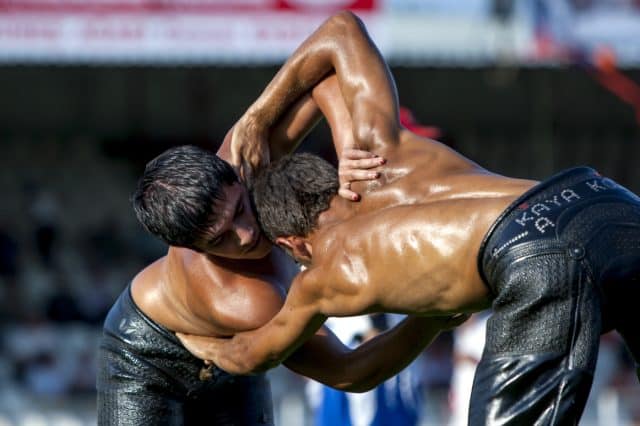
9. Cazgır: Before each match, a traditional announcer known as the cazgır introduces the wrestlers and recites blessings and praises. The cazgır plays an important ceremonial role, delivering poetic chants that often invoke divine protection and good sportsmanship. This adds a spiritual element to the competition, linking it to Turkish cultural and religious practices.

10. Victory Pose: After a wrestler wins, they often perform a traditional victory pose known as the “altın kemer” or “golden belt” pose. This is a symbolic gesture representing the pride and honor of victory. The winner may also receive the crowd’s admiration in this moment, which is deeply rooted in the sport’s history of celebrating heroism.
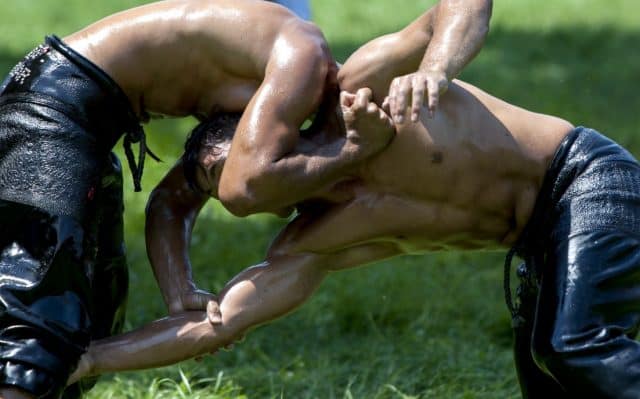
11. Greco-Roman Influence: Turkish oil wrestling is believed to have been influenced by ancient Greco-Roman wrestling styles. The use of olive oil and the wrestling techniques have similarities to those found in early Olympic games. However, Turkish oil wrestling has developed its own unique identity over the centuries.
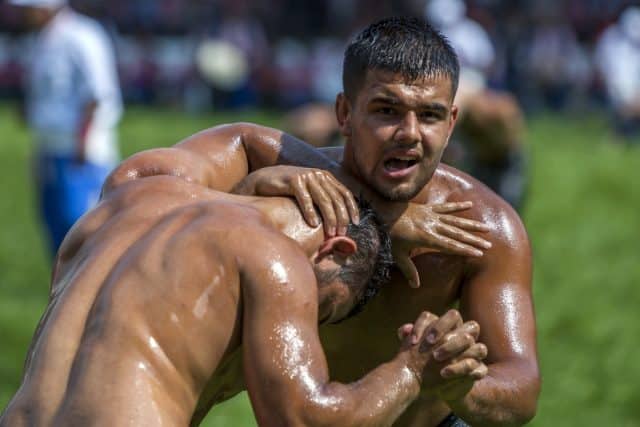
12. Wrestlers’ Brotherhood: Wrestlers often form close-knit bonds, becoming part of a “brotherhood” of pehlivans. They share a code of conduct emphasizing respect, humility, and honor, often living together and training under the guidance of a veteran wrestler. This strong sense of camaraderie helps preserve the traditions and values of the sport.
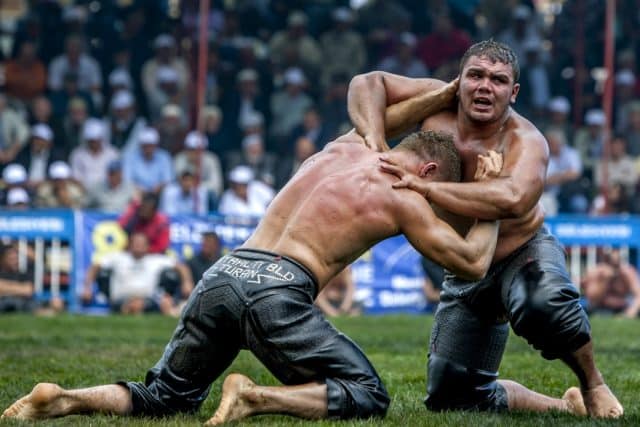
13. Match Length: A typical oil wrestling match can last up to 40 minutes, with some matches having no time limits in traditional settings. Matches often test the physical and mental endurance of the participants. In longer matches, wrestlers must balance patience with strategy to outlast their opponent.
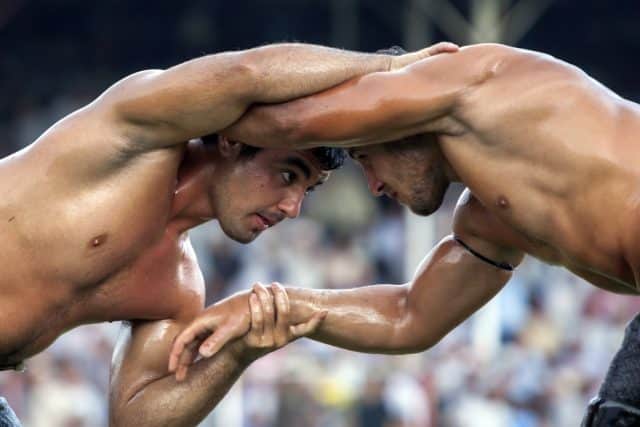
14. Golden Belt: The champion of the Kirkpinar festival wins the coveted altın kemer, or golden belt, which they hold for a year. If a wrestler wins the title for three consecutive years, they get to keep the belt permanently. This honor is highly sought after and symbolizes the ultimate achievement in oil wrestling.
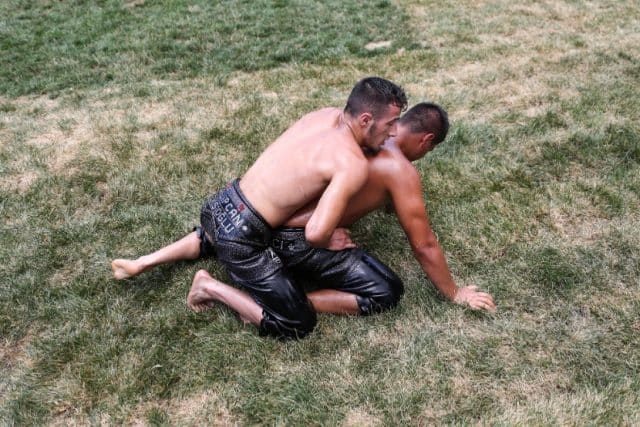
15. International Competitions: Although rooted in Turkey, oil wrestling has spread to other countries, with competitions being held in places like Greece, the Netherlands, and France. These international events celebrate Turkish culture while introducing the sport to new audiences. The global interest highlights the sport’s timeless appeal.
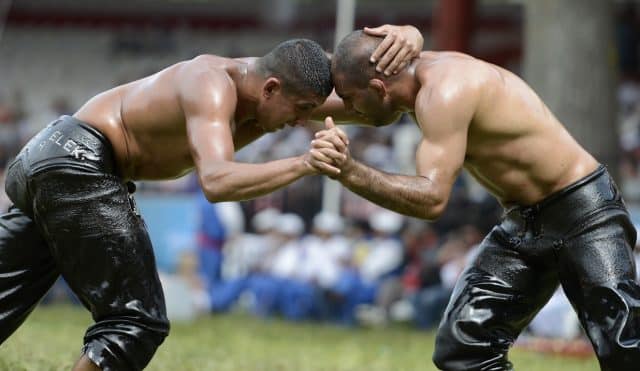
16. Technique Matters: In Turkish oil wrestling, strength alone is not enough to secure victory. The slippery nature of the olive oil forces wrestlers to rely on superior technique, flexibility, and strategy to gain an advantage over their opponent. Wrestlers must constantly adapt their approach throughout the match.
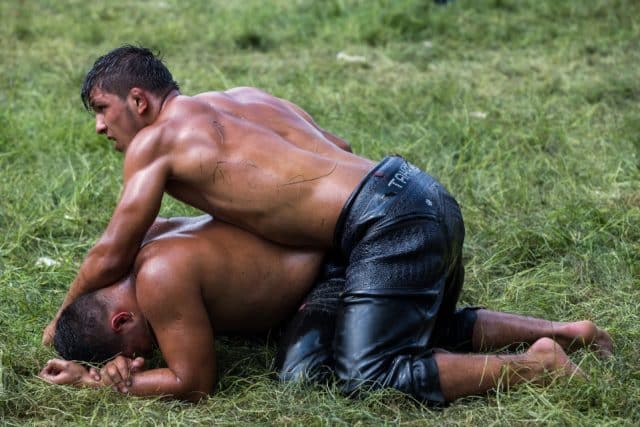
17. Physical Endurance: The demanding nature of Turkish oil wrestling requires tremendous physical endurance. Wrestlers must maintain a high level of fitness to compete, as matches can last for hours. In addition to strength, wrestlers need agility, stamina, and mental toughness to succeed.
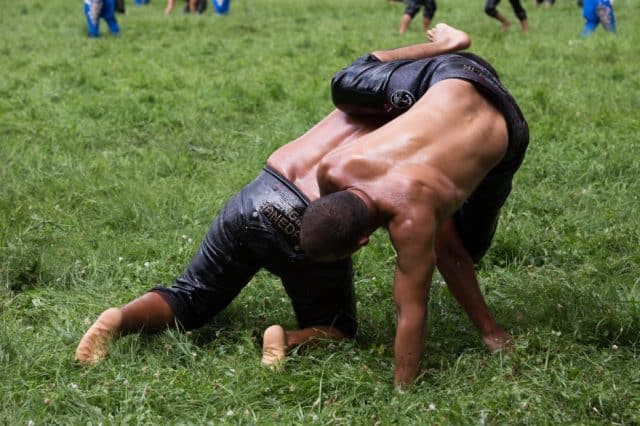
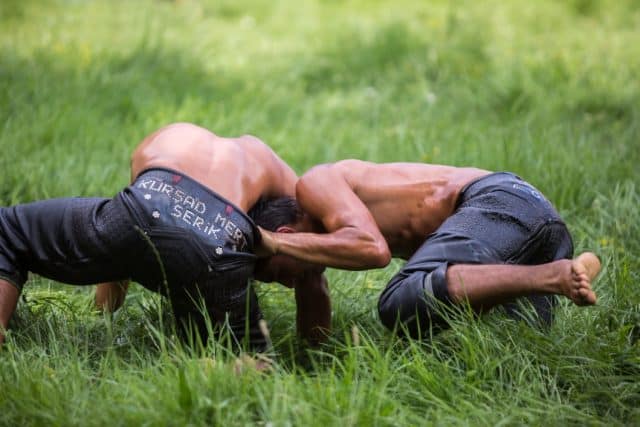
18. Submission: Victory in oil wrestling is achieved by either pinning the opponent’s back to the ground, lifting them off the ground, or forcing them to submit. Wrestlers use a variety of holds and techniques to gain control, often relying on leverage and body positioning. These submission tactics make each match a tactical battle.
19. Spiritual Meaning: For many wrestlers, oil wrestling carries a deeper spiritual significance beyond the physical competition. The sport is seen as a test of character, where qualities like humility, honor, and perseverance are just as important as physical strength. Wrestlers often dedicate their victories to God or seek blessings before matches.
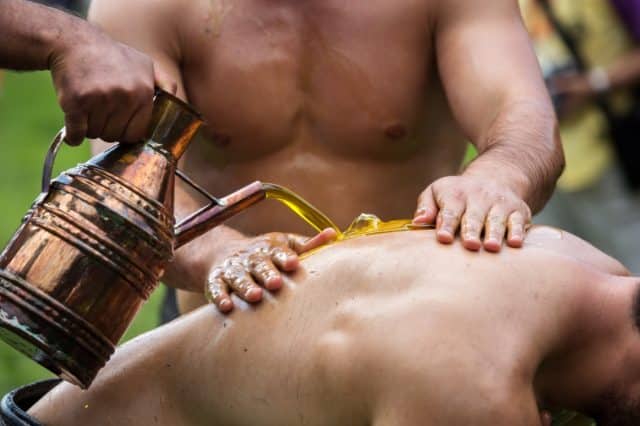
20. Ottoman Influence: Oil wrestling reached its height of popularity during the Ottoman Empire, where it became a symbol of strength and masculinity. Ottoman sultans were avid patrons of the sport, and some even participated in matches. The empire’s vast reach helped spread the tradition across its territories.
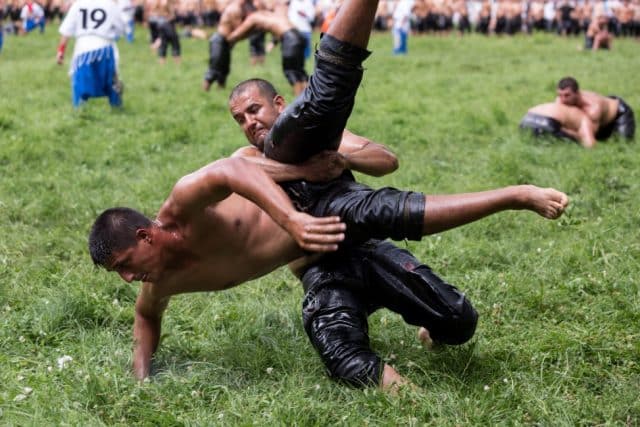
21. Champion’s Title: The champion of the Kirkpinar tournament is awarded the title Başpehlivan, meaning “chief wrestler.” This title is a prestigious honor that places the winner among the elite of Turkish wrestling. Başpehlivan is a position of respect in Turkish society, often bringing fame and admiration.

22. Pre-Match Ritual: Before the match begins, wrestlers perform a ritual known as peşrev, involving rhythmic steps, hand gestures, and sometimes prayer. This ritual serves both as a warm-up and a way to honor the sport’s traditions. The peşrev is an integral part of the wrestling culture, adding an element of artistry to the competition.
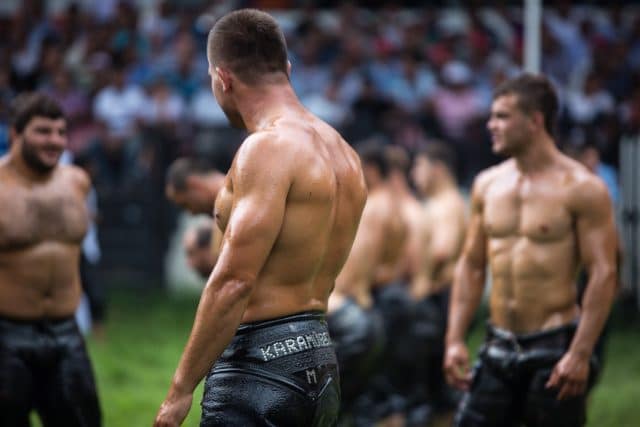
23. Lion Wrestling: Historical records indicate that Turkish wrestlers practiced with lions in ancient times, honing their skills and bravery. This practice was meant to prepare wrestlers for both battle and competition, demonstrating the physical and mental toughness required to face such dangerous opponents.
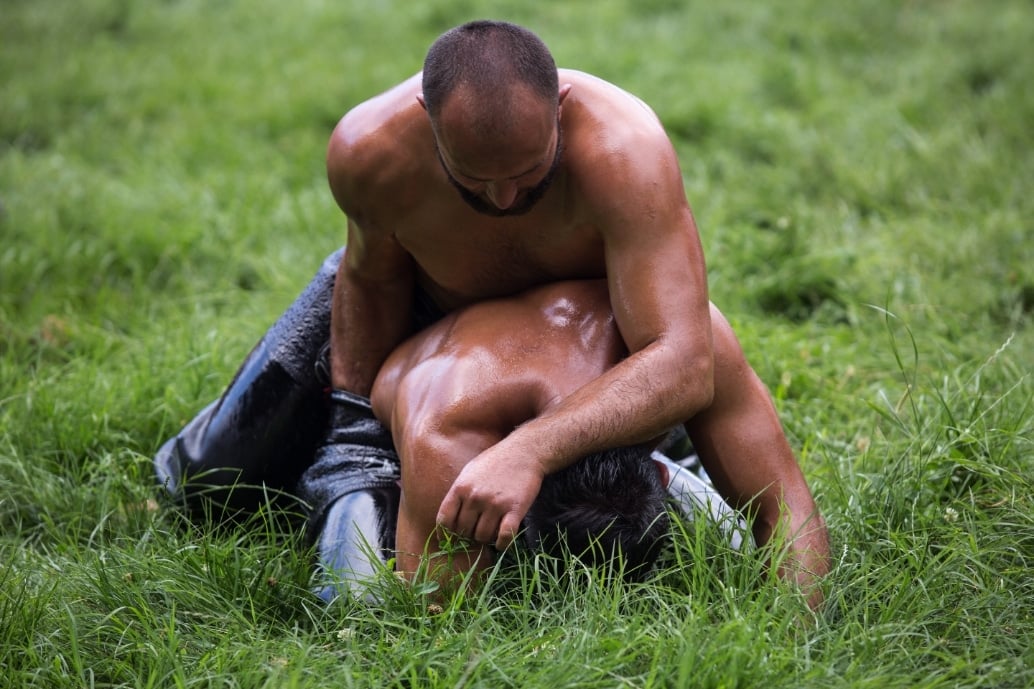
24. Honor System: Turkish oil wrestling adheres to a strict honor code that prohibits unsportsmanlike behavior. Cheating or disrespecting one’s opponent is not tolerated, and wrestlers are expected to compete with integrity. This code of ethics is central to maintaining the sport’s dignity and cultural significance.
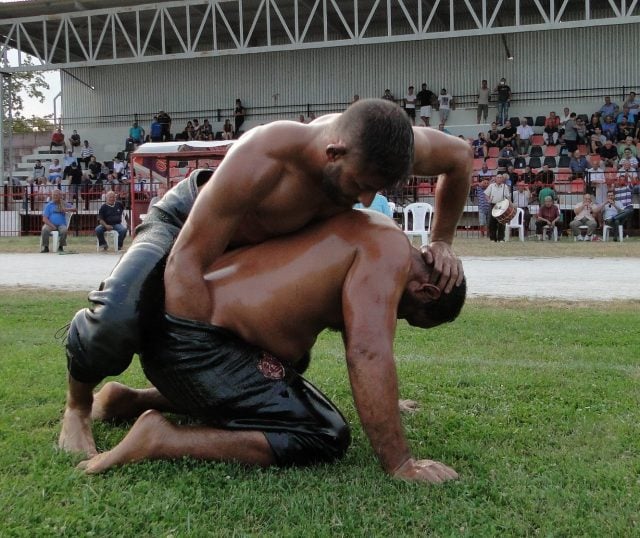
25. No Striking: Despite its physical intensity, Turkish oil wrestling forbids punching, kicking, or any form of striking. The focus is solely on grappling and wrestling, where skill and technique determine the outcome. This rule sets oil wrestling apart from many other combat sports.
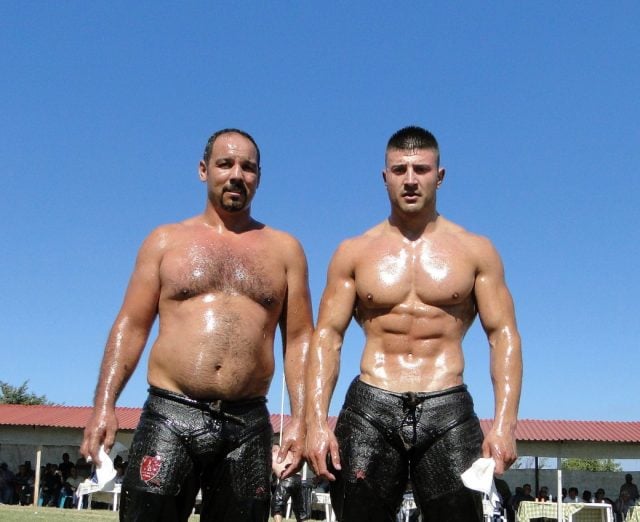
26. No Age Limit: Turkish oil wrestling is unique in that there is no formal age limit for participants. Wrestlers of all ages, from young teenagers to men in their 50s or 60s, can compete. This openness allows for the sport to be passed down through generations, with veteran wrestlers often serving as mentors.
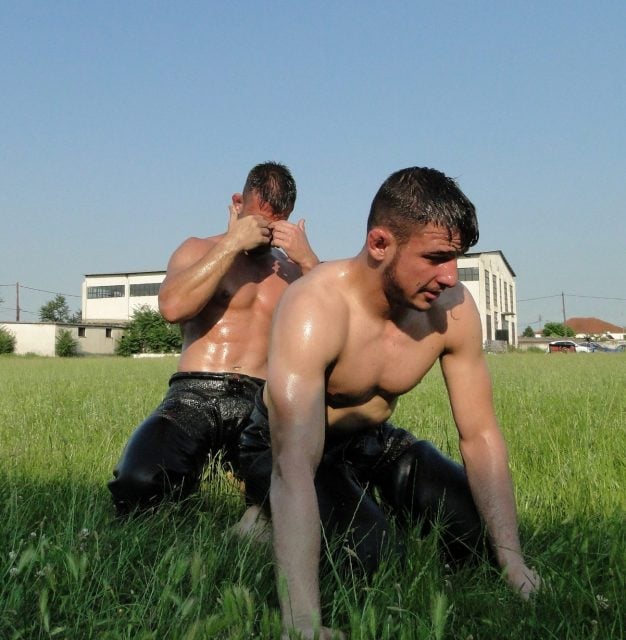
27. Heritage Site: The Kirkpinar Oil Wrestling Festival has been recognized by UNESCO as an Intangible Cultural Heritage of Humanity. This designation highlights the importance of preserving the traditions and values associated with oil wrestling. The festival is a cultural treasure that draws attention from people around the world.
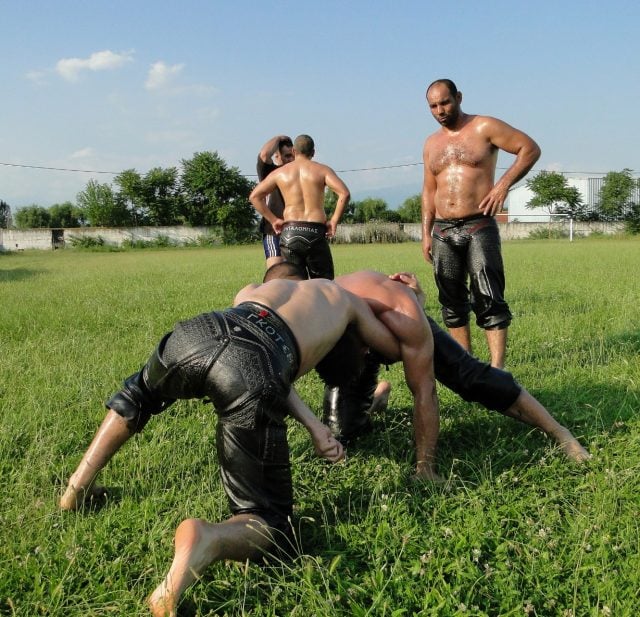
28. Non-stop Matches: Traditionally, oil wrestling matches continued without a time limit until one wrestler was declared the winner. These matches could last for hours, with both competitors showing incredible stamina and resilience. While modern matches are often capped at 40 minutes, the historical tradition of endurance remains a point of pride.
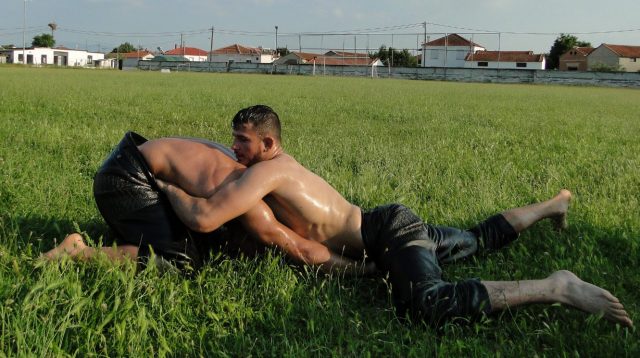
29. Respect for Elders: Younger wrestlers show deep respect for their elders, often bowing or kissing the hands of veteran champions. This gesture of respect underscores the value of hierarchy and tradition in Turkish wrestling culture. Elders are revered not only for their past victories but also for their wisdom and experience.
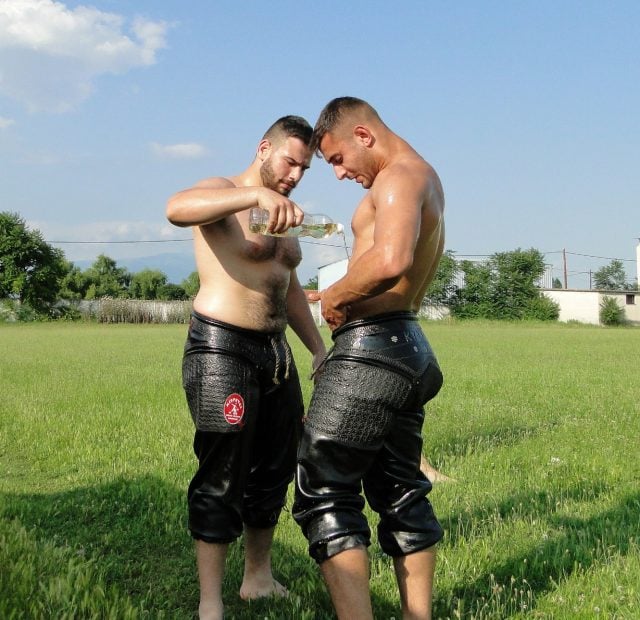
30. Olive Oil Tradition: The use of olive oil in wrestling has symbolic significance beyond its practical application. Olive oil is considered a symbol of purity, health, and protection in Turkish culture. Wrestlers believe that it brings good fortune and strength during matches, and its application is seen as a form of ritual preparation.
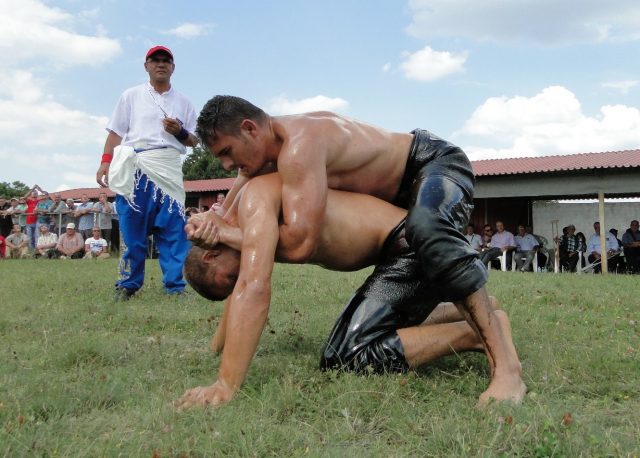
31. Intense Training: Wrestlers train rigorously throughout the year to maintain peak physical condition. Training often includes intense strength exercises, endurance drills, and technique practice. Many wrestlers start training from a young age, with some following family traditions that go back generations.
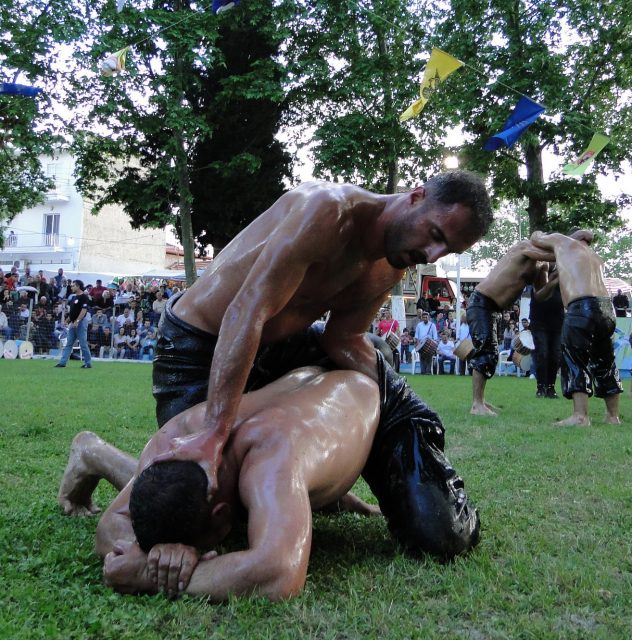
32. Wrestling Schools: In some towns and villages, there are traditional wrestling schools where young children are trained in the art of oil wrestling. These schools are often run by former champions who pass down their knowledge and techniques. The schools play an essential role in preserving the sport’s cultural heritage.
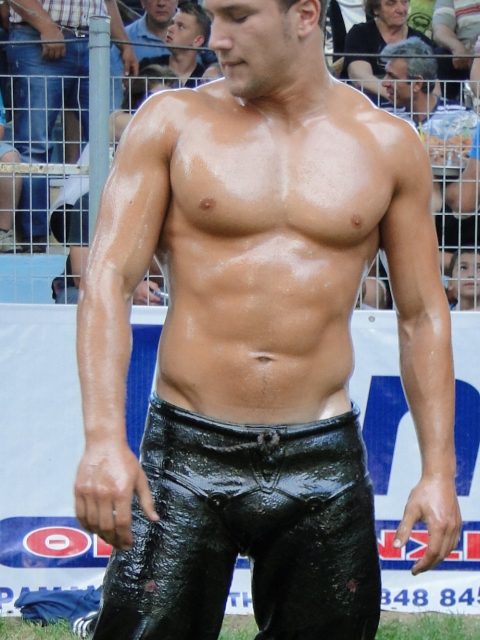
33. Tactical Grabs: One of the key strategies in oil wrestling is to grab the inside of the opponent’s kispet for better leverage. Since the oil makes gripping the body difficult, wrestlers use the kispet to control their opponent’s movements. This tactic requires both skill and precision to execute properly.
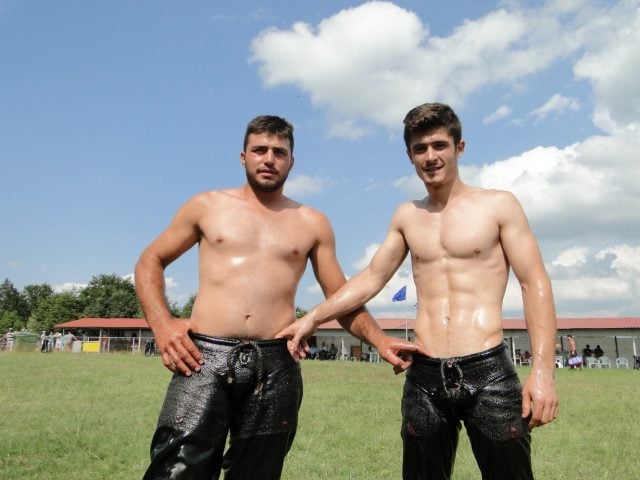
34. Wrestling on Grass: Wrestlers compete on natural grass fields, which become slippery as they are soaked in olive oil. This makes it challenging to maintain balance and adds an unpredictable element to the match. The grassy terrain, combined with the oil, creates a test of agility, strategy, and adaptability.
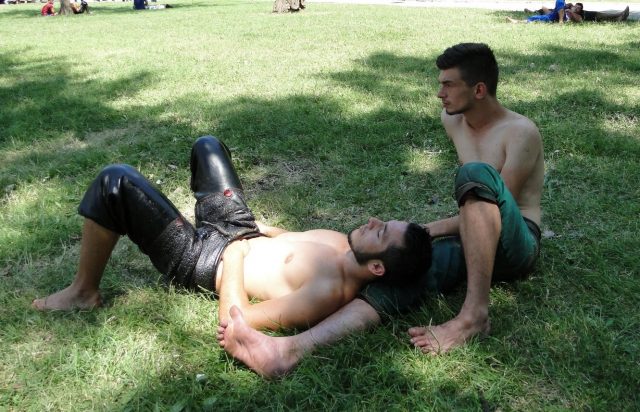
35. Pilgrimage of Wrestlers: Each year, wrestlers from all over Turkey make a pilgrimage to the Kirkpinar festival in Edirne. For many, attending the festival is a deeply meaningful experience, representing a chance to honor their heritage and compete at the highest level. The journey is often seen as a rite of passage for aspiring pehlivans.
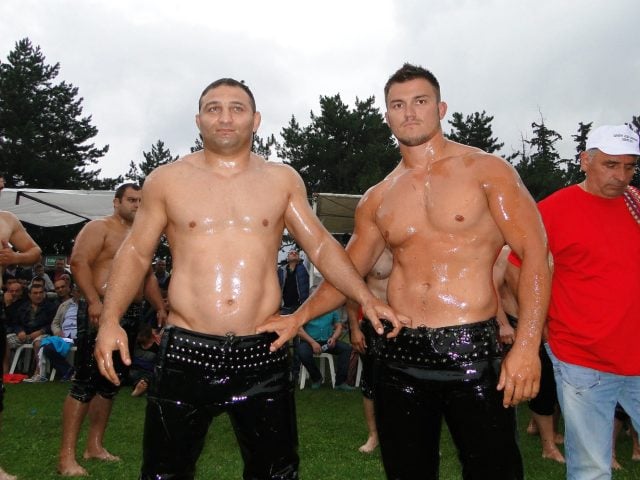
36. Cultural Celebrations: The Kirkpinar festival is not just about wrestling; it includes a week-long celebration of Turkish culture with music, feasts, and dancing. Spectators enjoy traditional Turkish cuisine and participate in local customs. The festival provides an opportunity for people to come together and celebrate both the sport and their cultural identity.
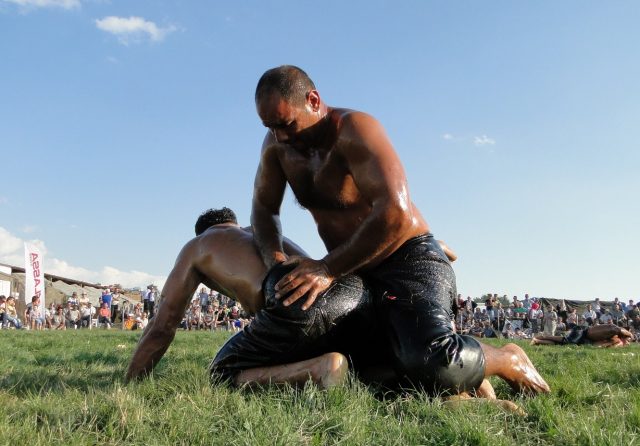
37. Symbol of Masculinity: Historically, oil wrestling has been closely associated with ideals of Turkish masculinity, strength, and heroism. Pehlivans were admired for their physical prowess, but also for their character, discipline, and respect for tradition. The sport still embodies these values in modern Turkish society.
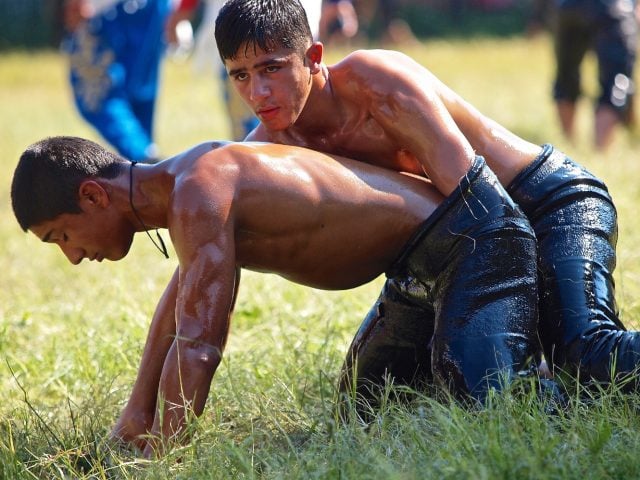
38. Prized Belt: The golden belt awarded to the champion of Kirkpinar is one of the most coveted prizes in Turkish sports. Winning the belt represents not just a victory in the ring, but also social status and recognition within the wrestling community. If a wrestler wins the belt three years in a row, they are awarded it permanently.
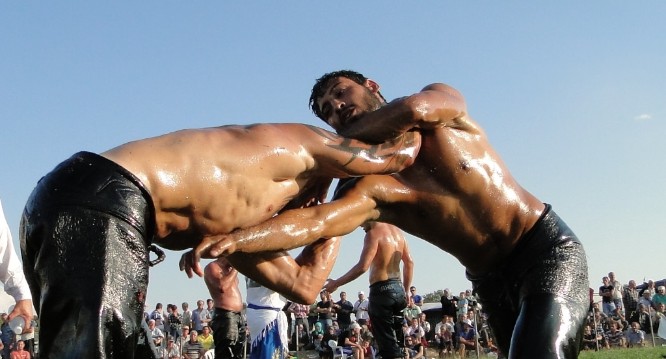
39. Peşrev Ritual: The pre-match peşrev ritual is a ceremonial series of movements performed by the wrestlers before the bout begins. It involves rhythmic steps, gestures, and sometimes prayers for success. The ritual is an important way for wrestlers to mentally prepare and pay homage to the traditions of the sport.
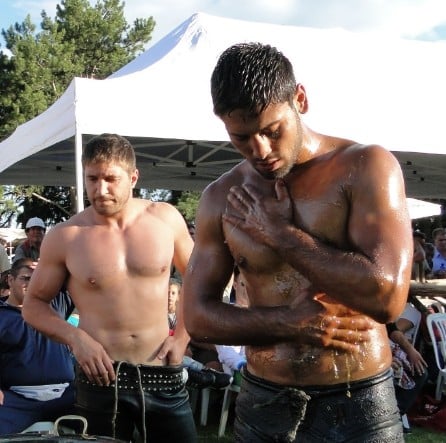
40. Historical Sultans: Many Ottoman sultans were fans of oil wrestling, and some even took part in matches themselves. Sultans used the sport as a way to demonstrate their physical abilities and connect with their people. Their patronage of oil wrestling helped elevate the sport’s status and spread its influence throughout the empire.
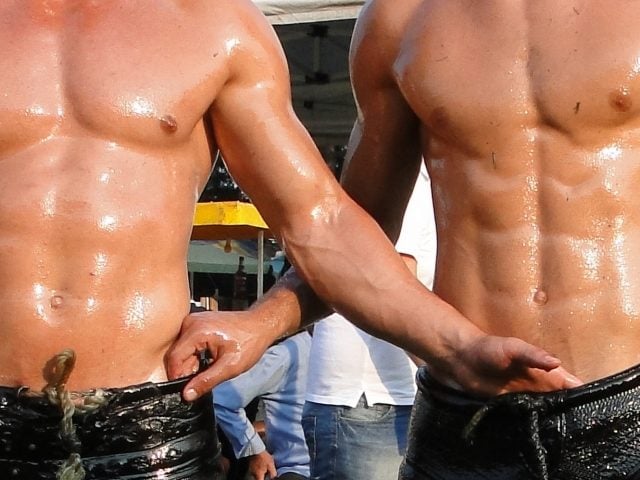
41. Traditional Music: Drummers and musicians playing the zurna (a traditional woodwind instrument) are a key part of the atmosphere at oil wrestling matches. The music sets the tone for the competition, with lively rhythms energizing both the wrestlers and the crowd. The combination of music and sport creates a festival-like atmosphere.
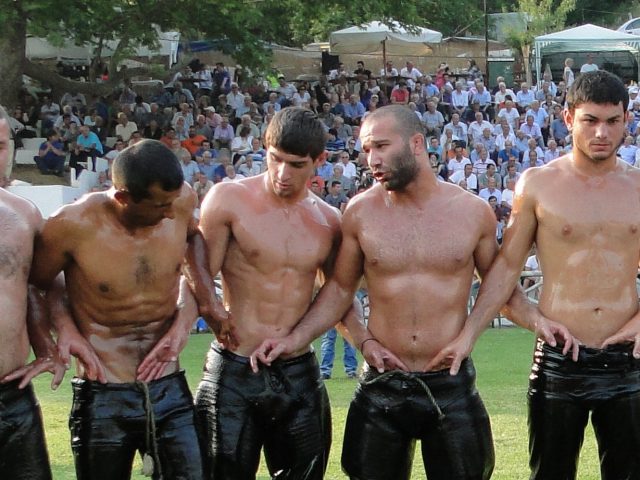
42. Olive Oil Massage: Wrestlers often give themselves an olive oil massage before the match, both to limber up and as a mental preparation ritual. The act of rubbing oil into their skin serves as a moment of focus and concentration. It also helps make their bodies slippery, adding to the challenge of the match.
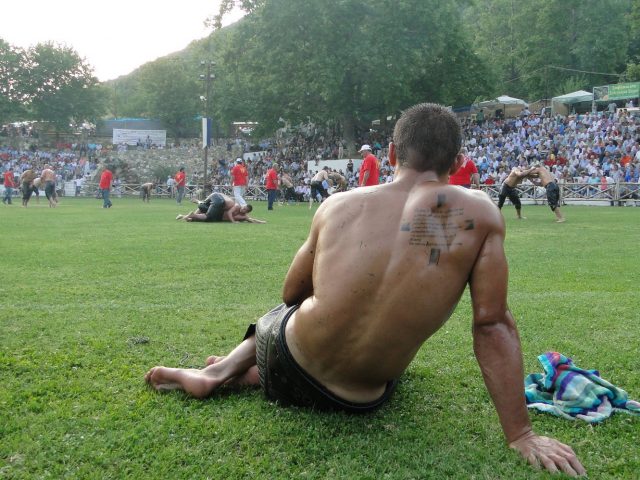
43. Village Competitions: While the Kirkpinar festival is the most famous, oil wrestling competitions are held in villages across Turkey throughout the year. These local tournaments are important cultural events that bring communities together. They provide a platform for young wrestlers to gain experience and showcase their skills.
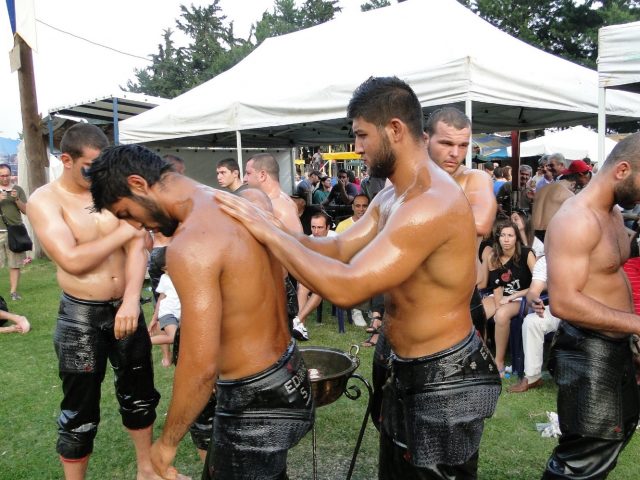
44. Tactical Body Movement: Wrestlers develop special techniques for maneuvering their bodies to counter the effects of the oil. Movements are calculated to prevent their opponents from gaining a strong hold. Mastering these movements is essential for success, as they require both balance and quick reflexes.
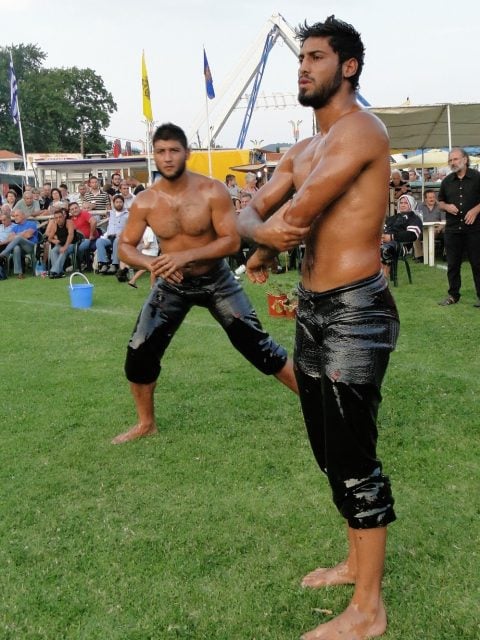
45. Weight of the Kispet: The kispet, the leather pants worn by wrestlers, can weigh up to 13 pounds, adding an extra challenge to the sport. The heavy, durable material is designed to withstand the rigors of the match, but it also requires wrestlers to be in top physical condition to move freely while wearing it.
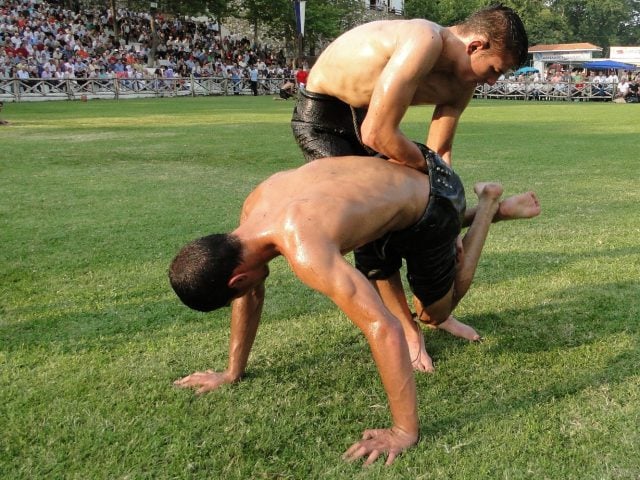
46. Ritual of the Oil: Pouring olive oil on the body is more than a practical measure—it’s a significant ritual that symbolizes strength, purity, and tradition. The oil not only makes the match more challenging but also connects wrestlers to their ancestors who have followed this tradition for centuries.
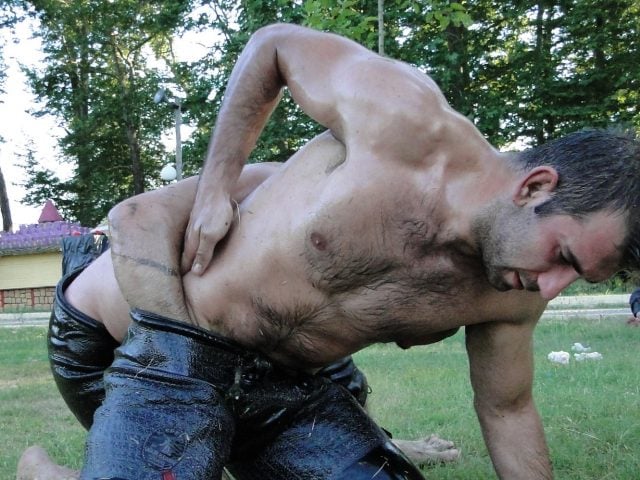
47. High Respect for Champions: Wrestlers who win the title of Başpehlivan earn tremendous respect and admiration in Turkish society. The title is not just about athletic ability but also about character, sportsmanship, and dedication to the sport. Champions often become local heroes and are treated with high regard.
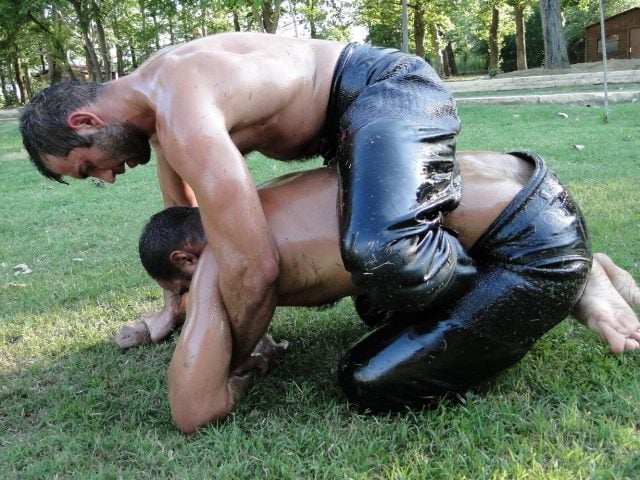
48. Women in Oil Wrestling: While traditionally a male-dominated sport, women’s oil wrestling has begun to gain visibility in recent years. Female wrestlers are now competing in some regional tournaments, challenging traditional gender roles and bringing a modern perspective to this ancient sport.
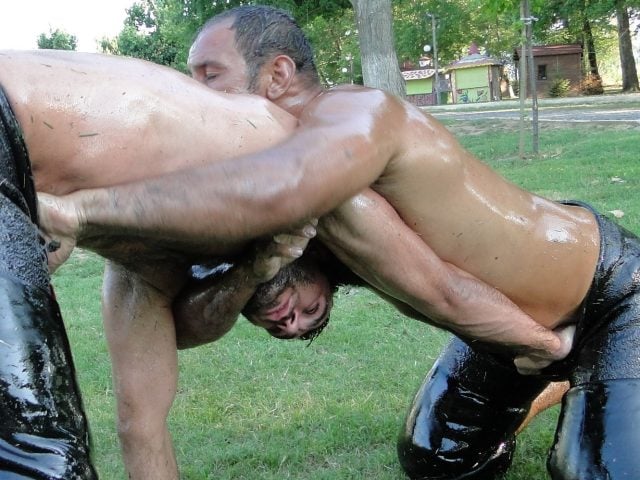
49. Lifting Technique: In Turkish oil wrestling, lifting an opponent off the ground is considered a decisive way to win a match. This move, called paça kazık, requires immense strength and balance, and it demonstrates a wrestler’s dominance. Successfully lifting an opponent off their feet can end the match quickly.
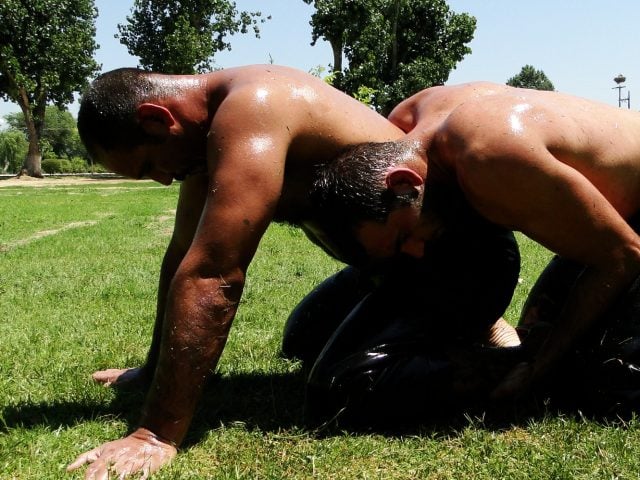
50. Legendary Wrestlers: Figures like Kel Aliço and Adali Halil are legendary names in the history of oil wrestling. Kel Aliço was undefeated for 26 years in the 19th century, and Adali Halil is remembered for his incredible strength and technique. These champions continue to inspire new generations of wrestlers.
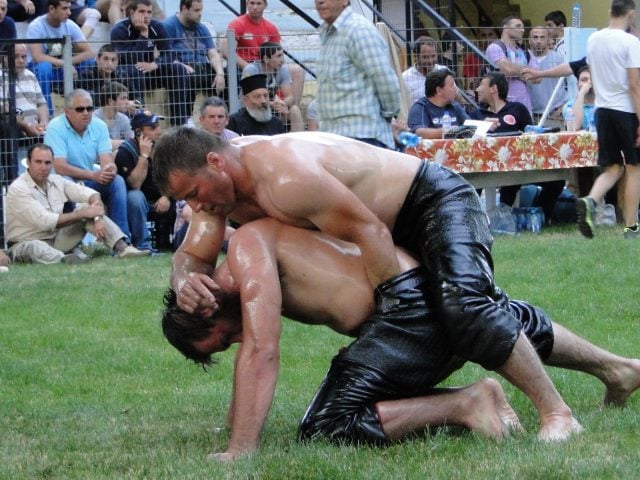
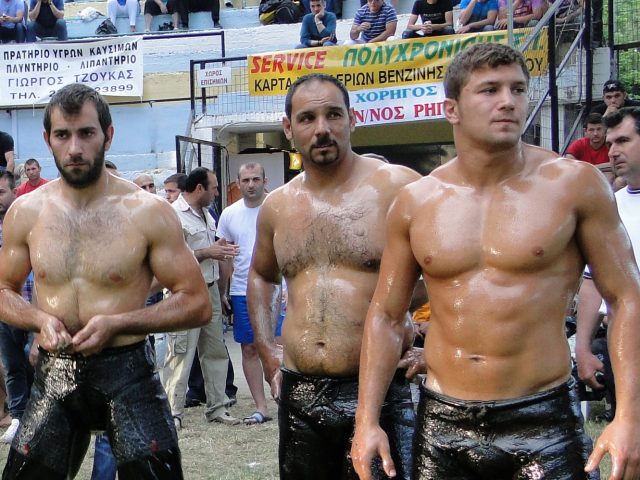

More Stories

